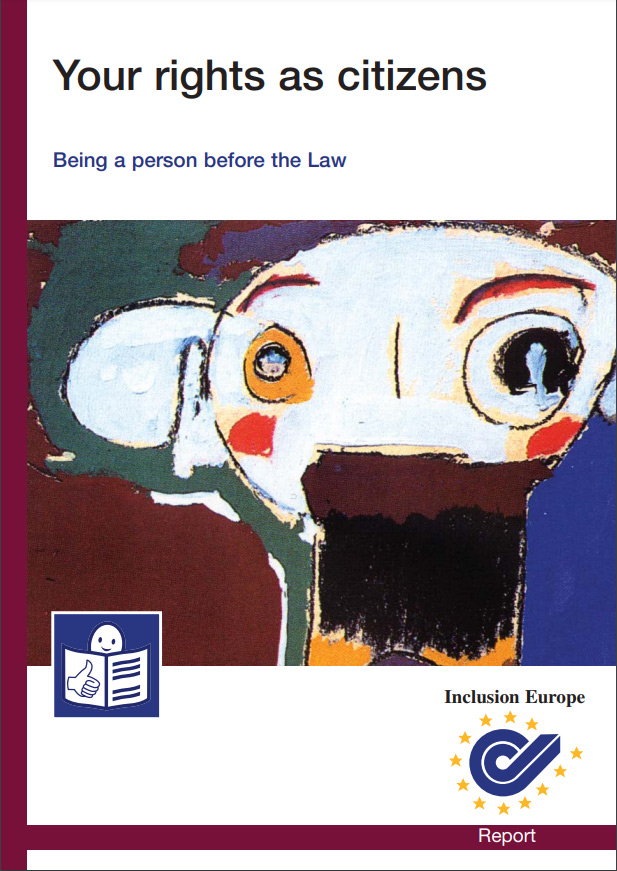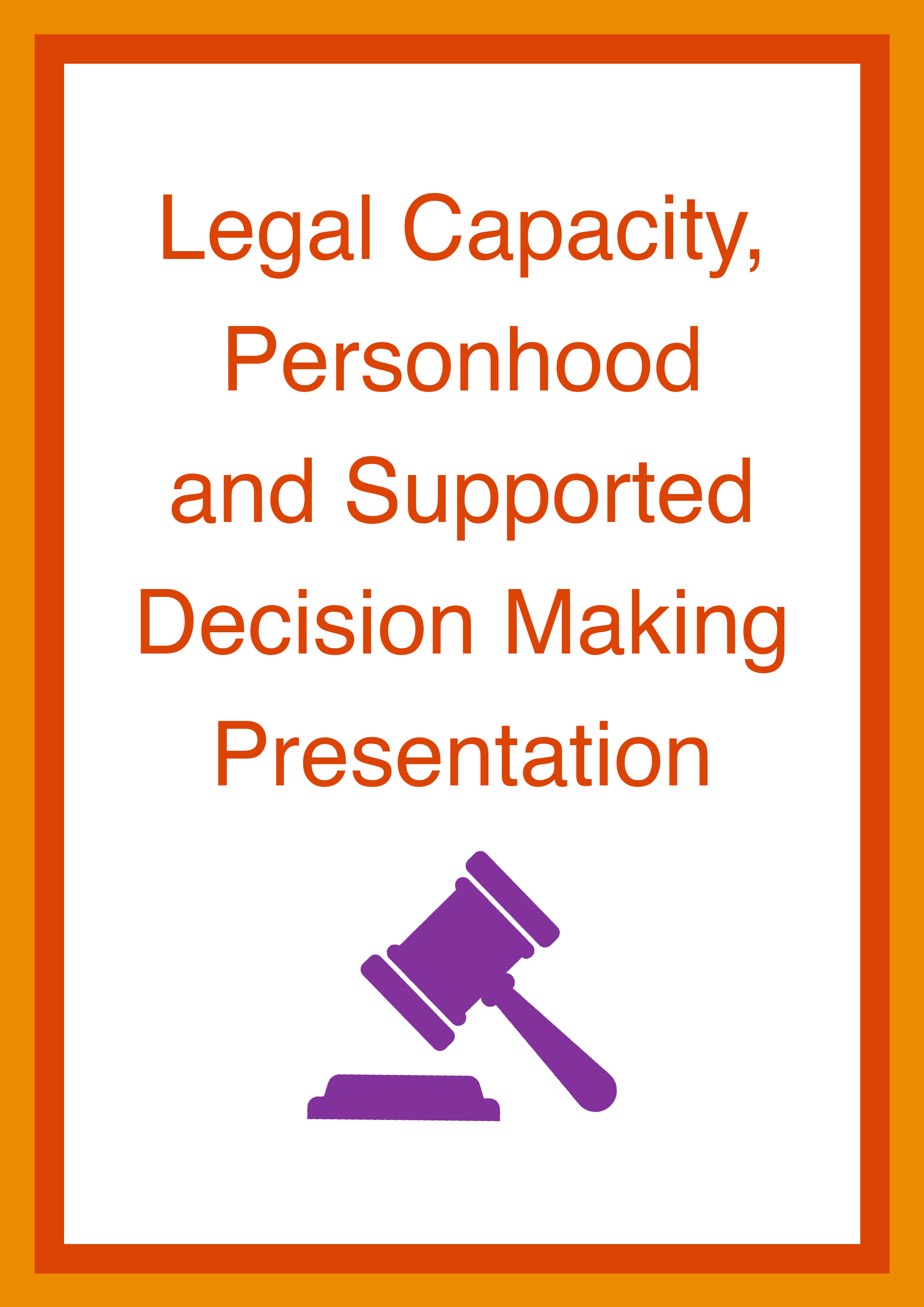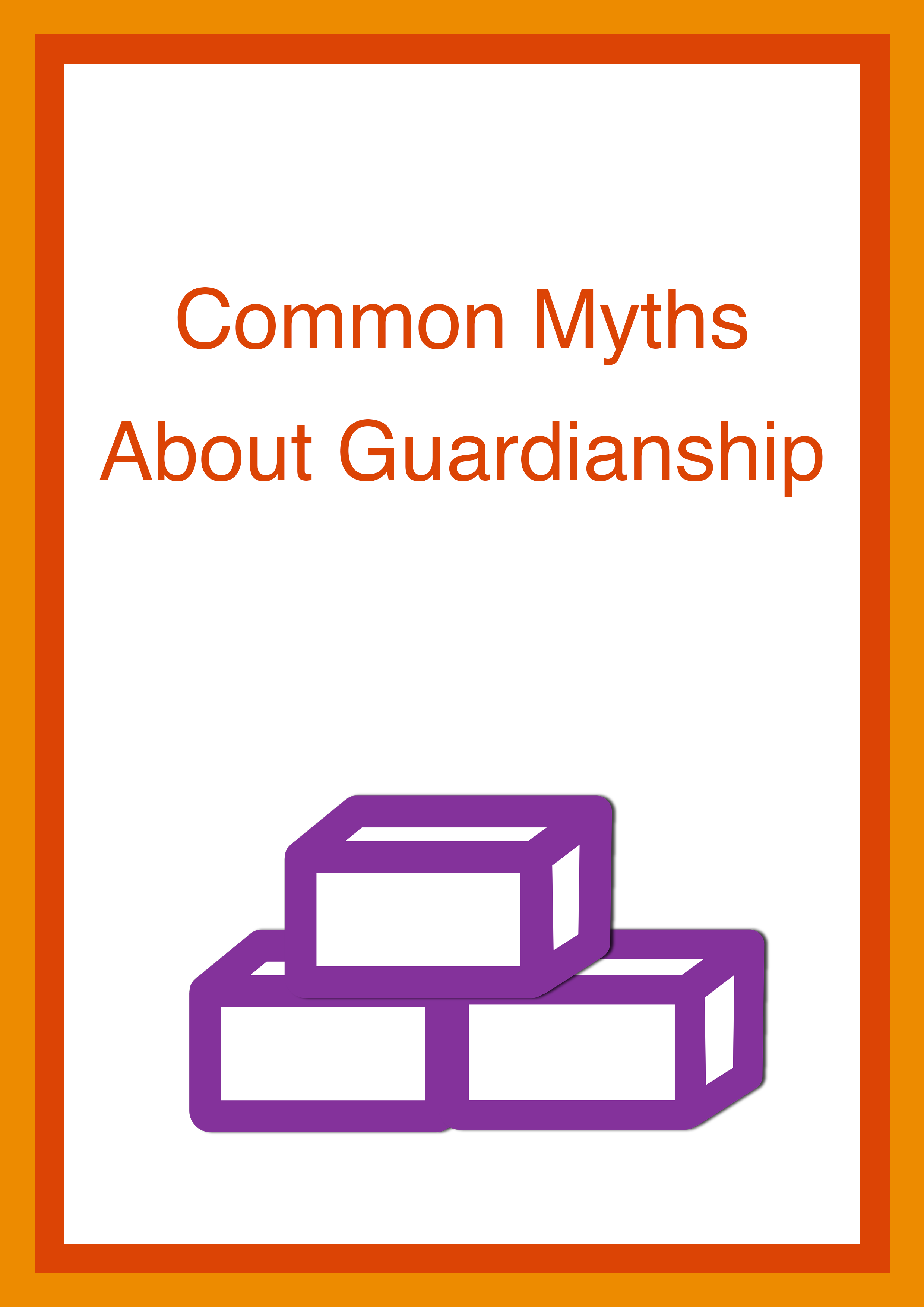Legal
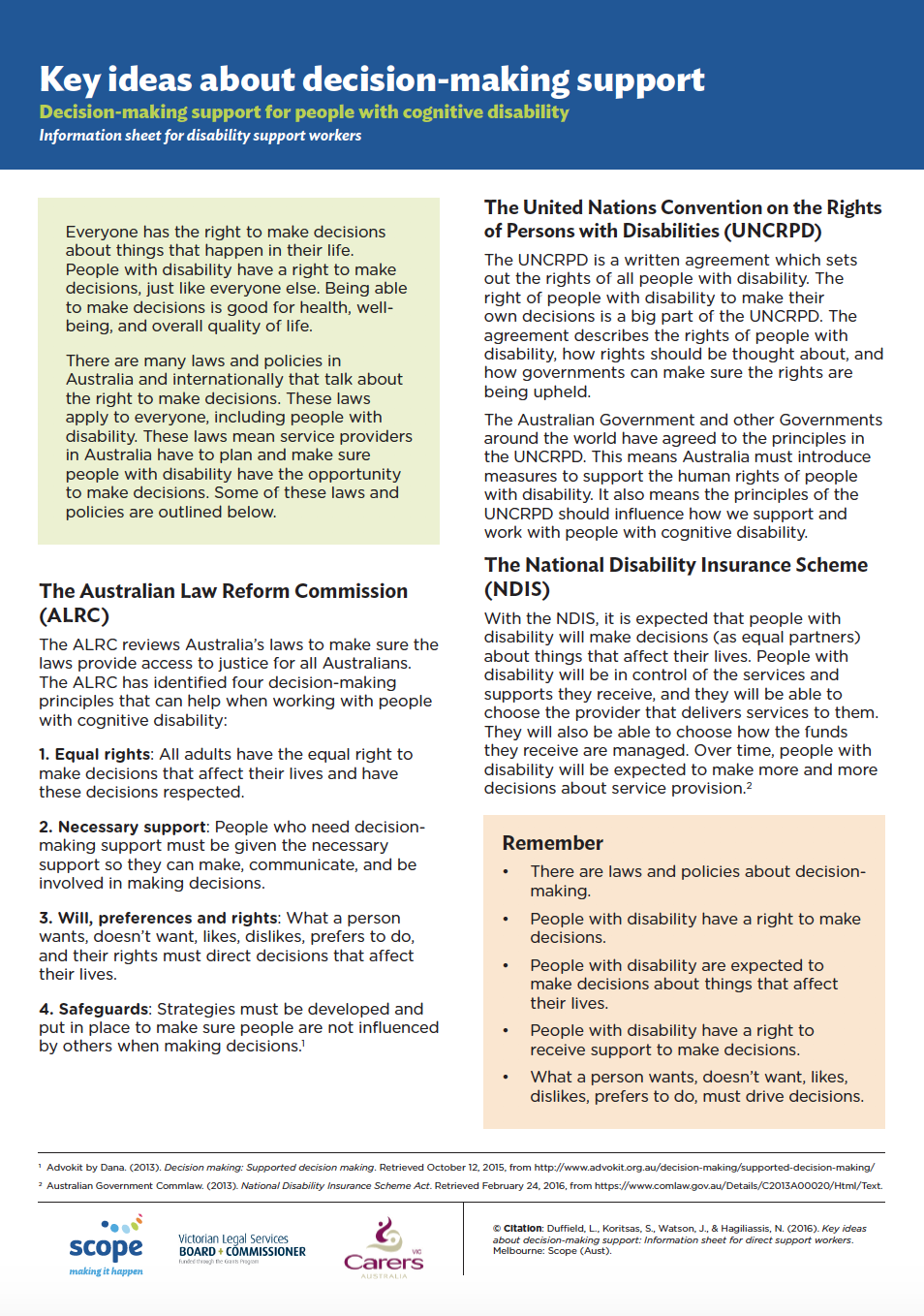
Key Ideas About Decision-Making Support
A one page information sheet outlining some key ideas about decision-making support. It talks about how The Australian Law Reform Commission (ALRC), The United Nations Convention on the Rights of Persons with Disabilities (UNCRPD) and The National Disability Insurance Scheme (NDIS) are all put in place to ensure all people have the rights to make decisions about their lives.
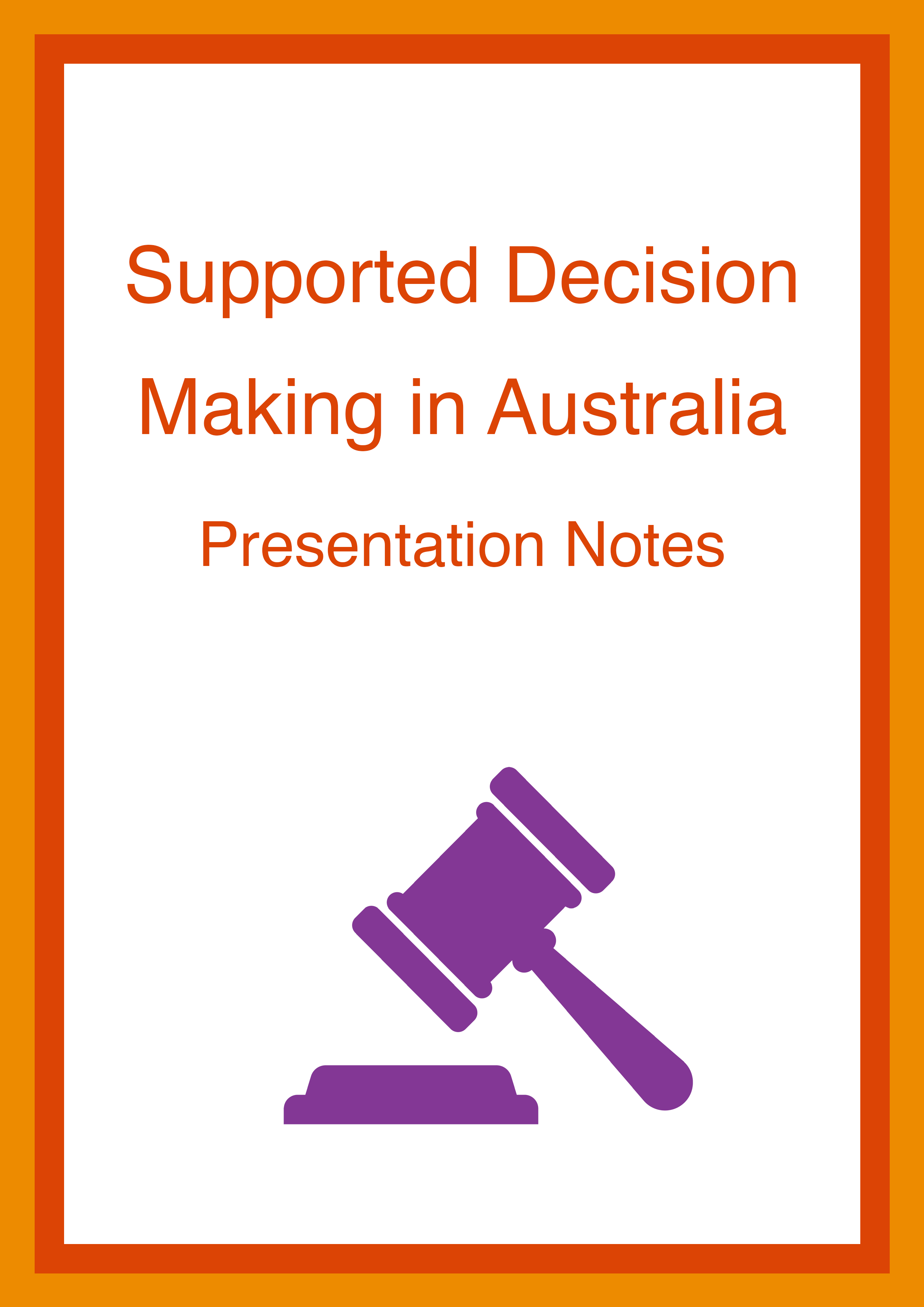
Supported Decision Making Presentation Victoria
This text was prepared as the basis of a presentation delivered at the Victorian Office of the Public Advocate, and also attended by staff of the Victorian Law Reform Commission
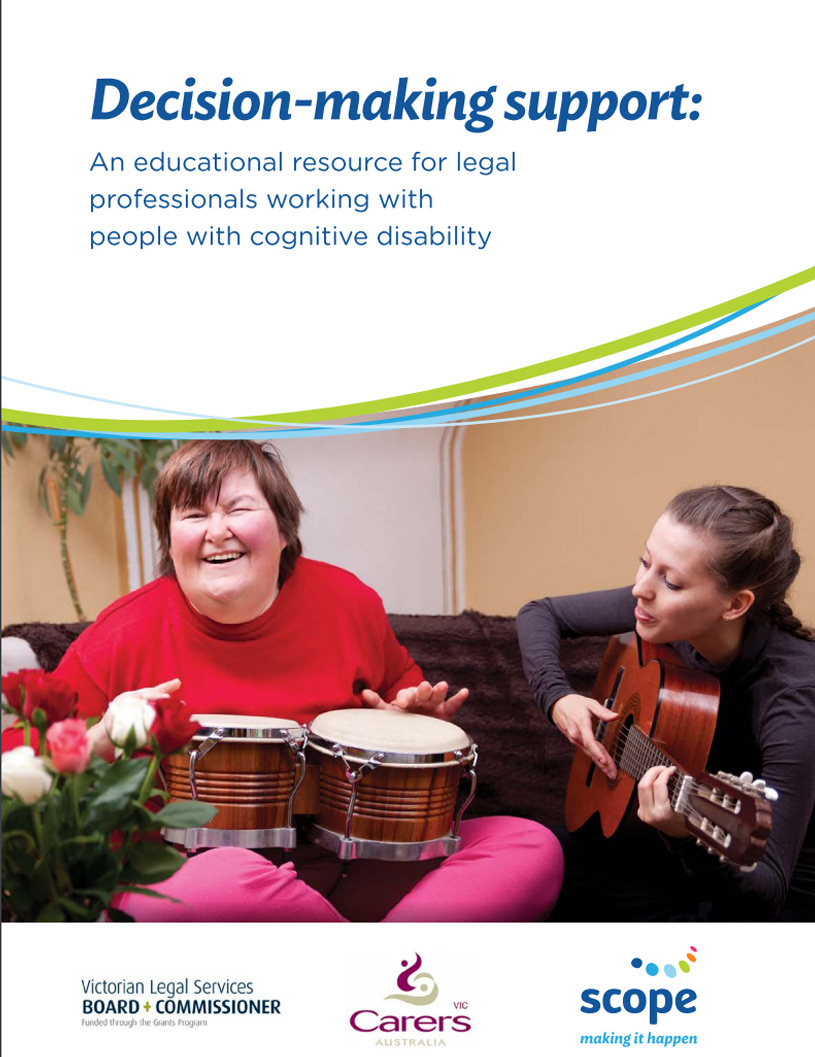
Decision Making Support: An Educational Resource for Legal Professionals Working with People with Cognitive Disability
Often, people with cognitive disability want support to make decisions. Indeed all people often want or need support to make decisions. This booklet sets out guidelines for legal professionals to assist people with cognitive disability make decisions.
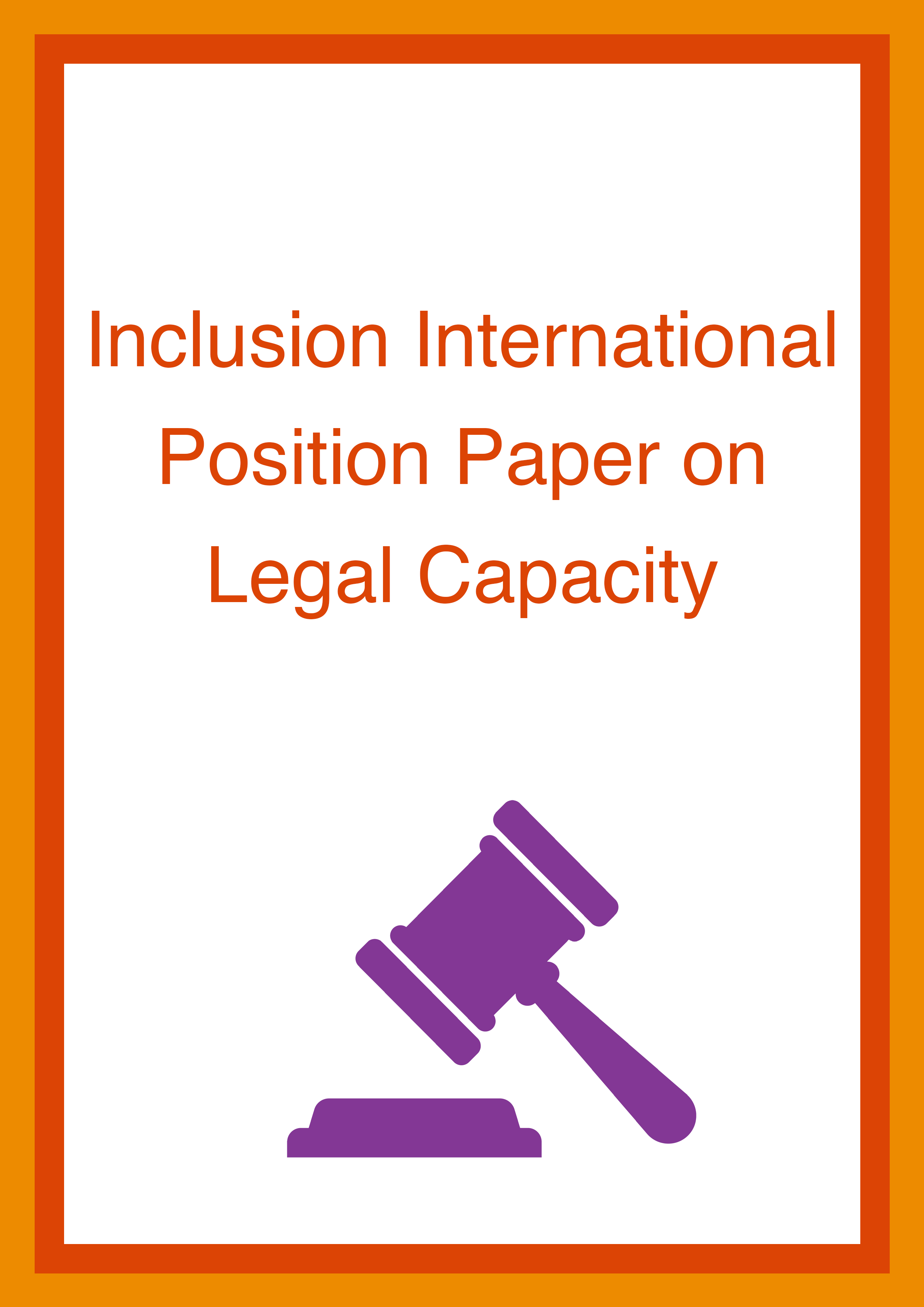
Inclusion International Position Paper on Legal Capacity
Inclusion International demands the right of every person with an intellectual disability to have
their right to make decisions recognized and to receive the support they require in making
those decisions. The right to legal capacity includes the capacity to have rights and the capacity to act on those rights, i.e. the capacity to make legal agreements with others.

Discussion Paper Calling for Development of a National Supported Decision Making Framework
This discussion paper describes supported decision making, what it is, how it works and why it’s important. It calls for the development of a National Framework for supported decision making which would establish Australian practice. A National Framework is required because supported decision making has implications for a broad range of policy areas across multiple levels of government that reach into people’s private lives.
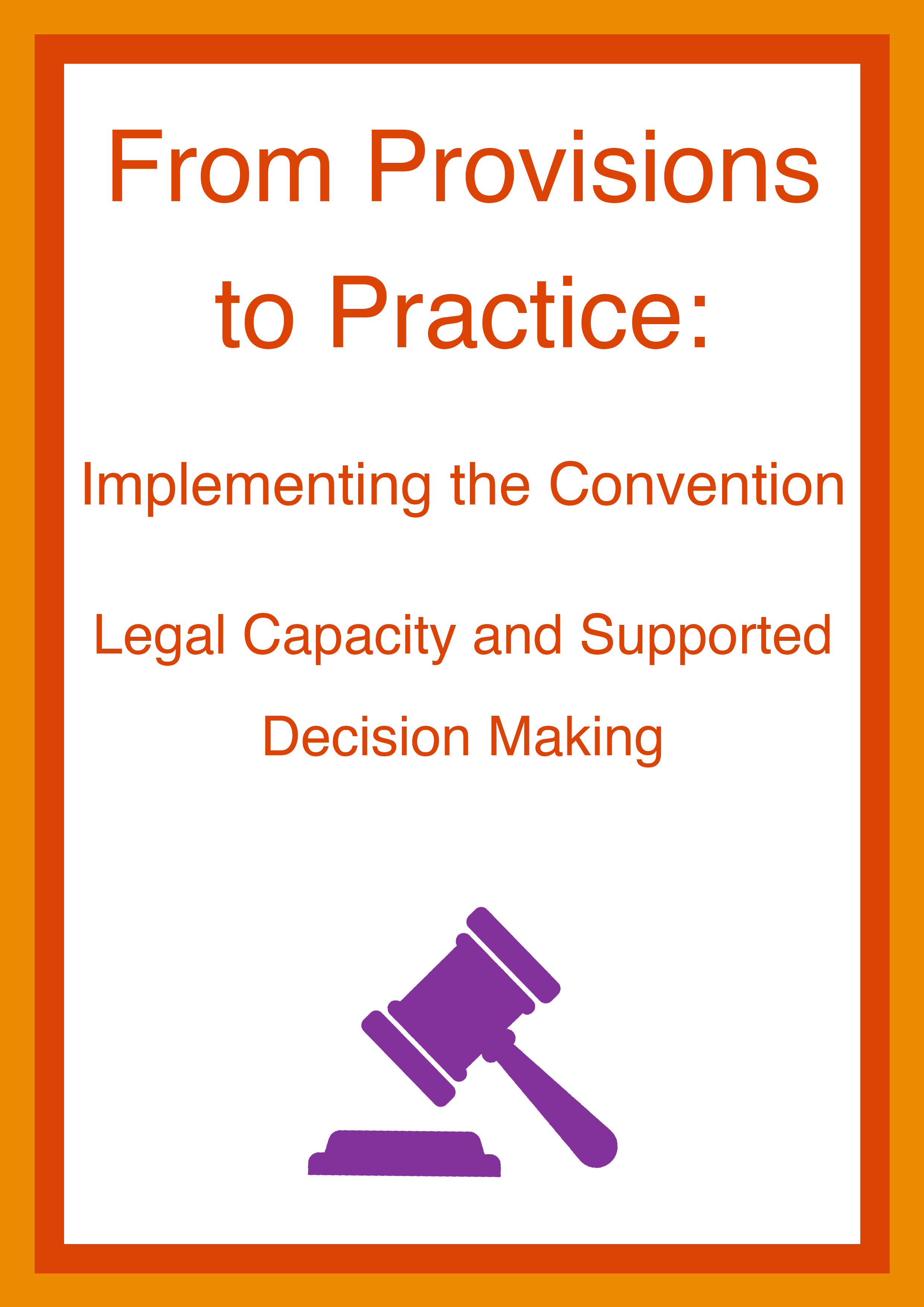
From Provisions to Practice: Implementing The Convention
With supported decision-making, the presumption is always in favour of the person with a disability who will be affected by the decision. The individual is the decision maker; the support person(s) explain(s) the issues, when necessary, and interpret(s) the signs and preferences of the individual.
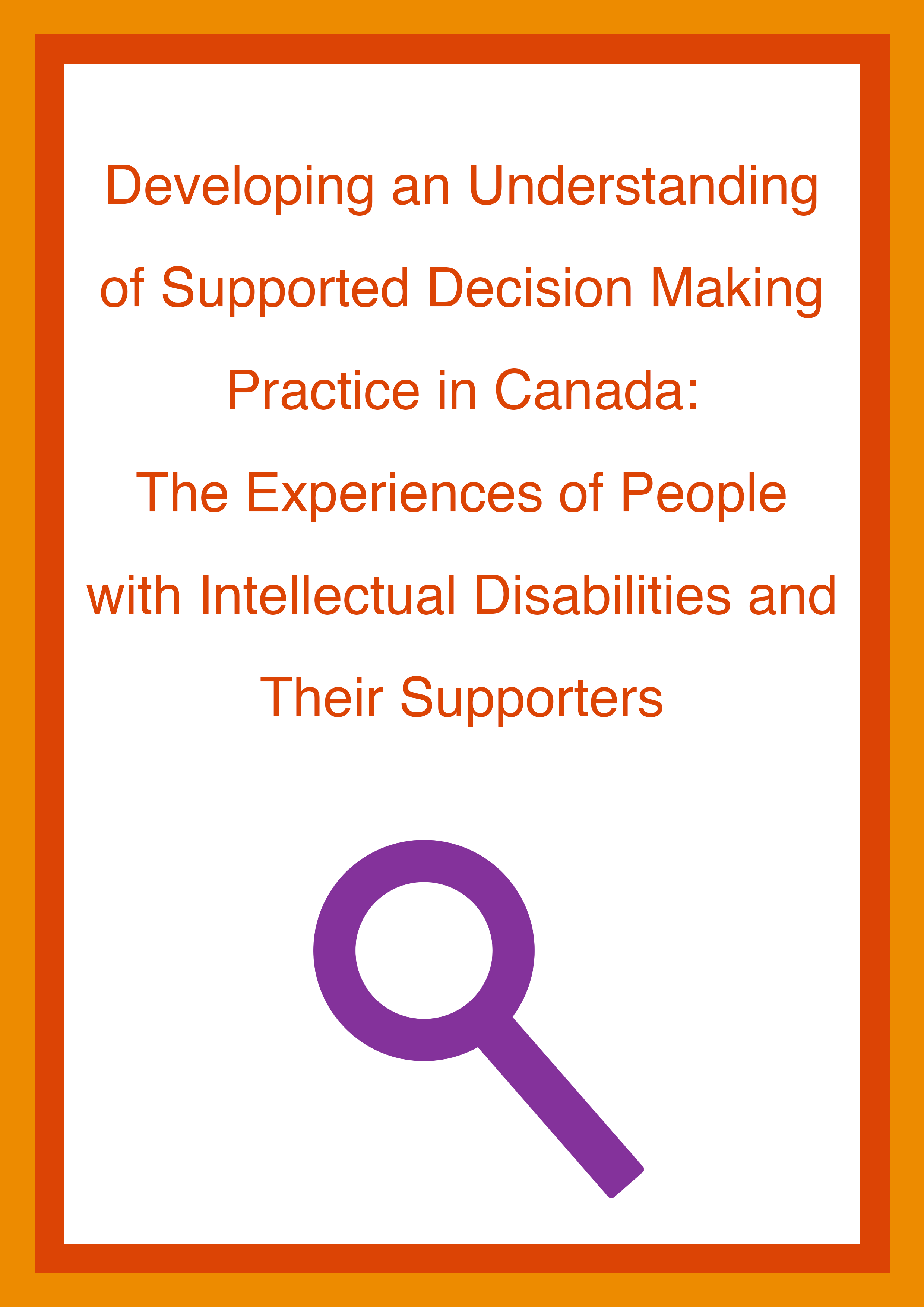
Developing an Understanding of Supported Decision-Making Practice in Canada: The Experiences of People with Intellectual Disabilities and Their Supporters
The aim of this research was to understand how people with intellectual disabilities were supported with decision making in the context of two legal mechanisms which create opportunities for supported decision-making in Canada, representation agreements and microboards. The research used a constructivist grounded theory methodology, interviewing and observing the decision making of seven people with mild to severe intellectual disabilities and 25 decision supporters. Thirty-four interviews and 104 hours of participant observation were conducted.
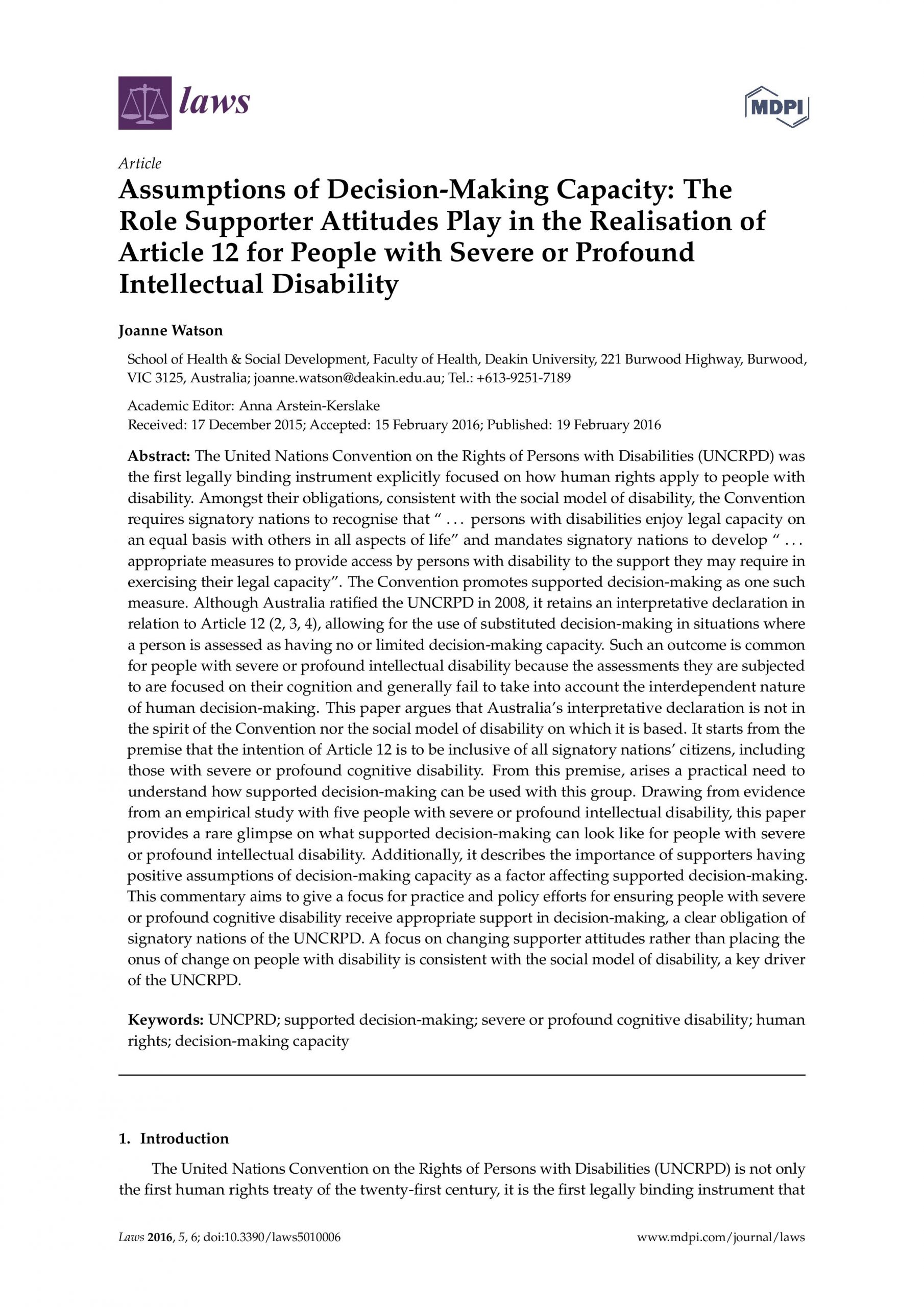
Assumptions of Decision-Making Capacity: The Role Supporter Attitudes Play in the Realisation of Article 12 for People with Severe or Profound Intellectual Disability
The United Nations Convention on the Rights of Persons with Disabilities (UNCRPD) was the first legally binding instrument explicitly focused on how human rights apply to people with disability. Amongst their obligations, consistent with the social model of disability, the Convention requires signatory nations to recognise that “ . . . persons with disabilities enjoy legal capacity on an equal basis with others in all aspects of life” and mandates signatory nations to develop “… appropriate measures to provide access by persons with disability to the support they may require in exercising their legal capacity”.
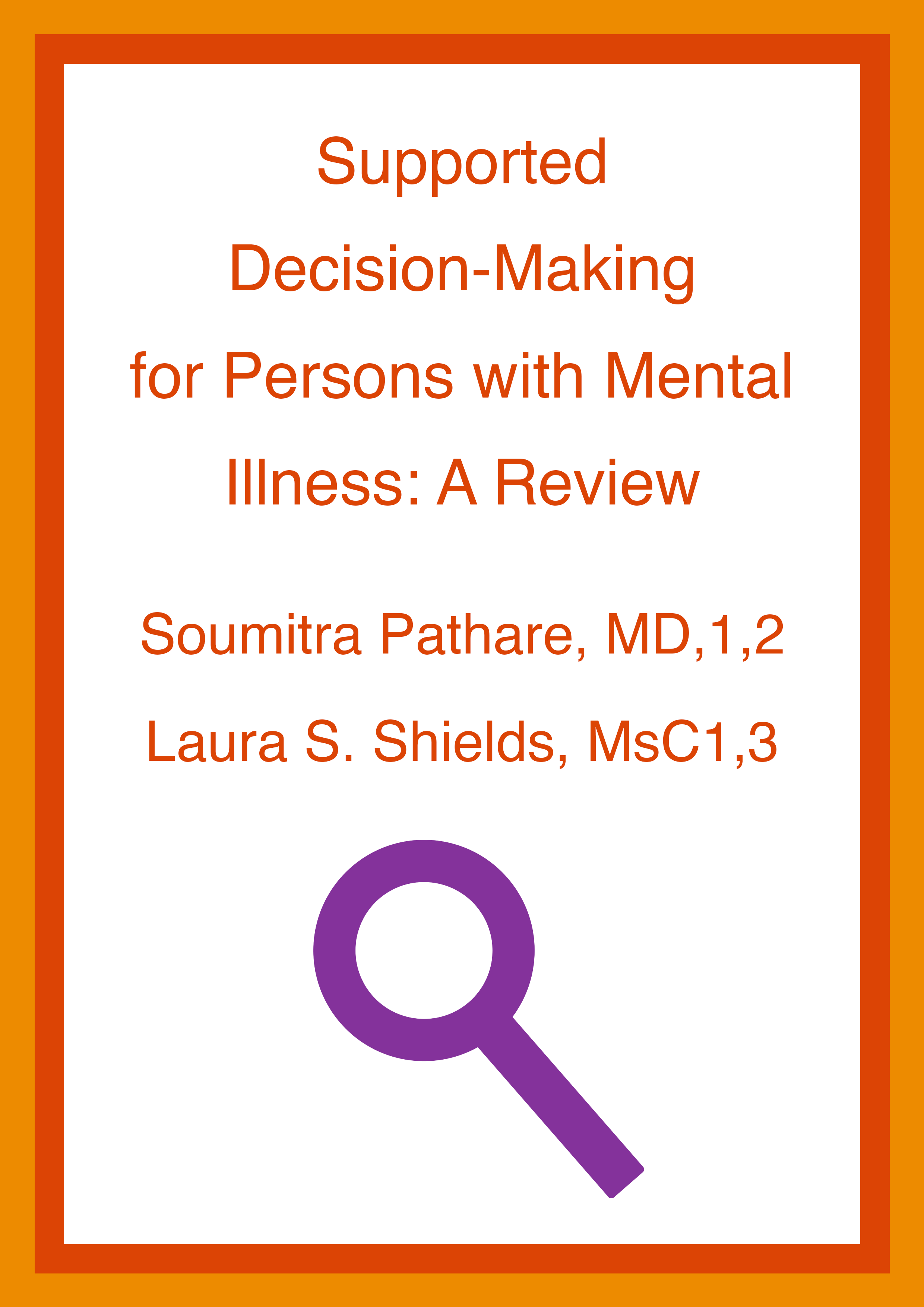
Supported Decision-Making for Persons with Mental Illness: A Review
This review highlights the need for additional research in this area to better guide models, which can be utilised in domestic legislation, particularly in low and middle income countries, to better implement the ideals of Article 12 of the CRPD. Persons with mental illness are often not afforded the same opportunity to make decisions on a par with others in society. Article 12 of the International Convention on the Rights of Persons with Disabilities (CRPD) states that persons with disabilities should have equal recognition before the law and the right to exercise their legal capacity. Exercising legal capacity can mean making decisions about employment, medical or psychosocial treatment, property, finances, family, and participation in community activities.
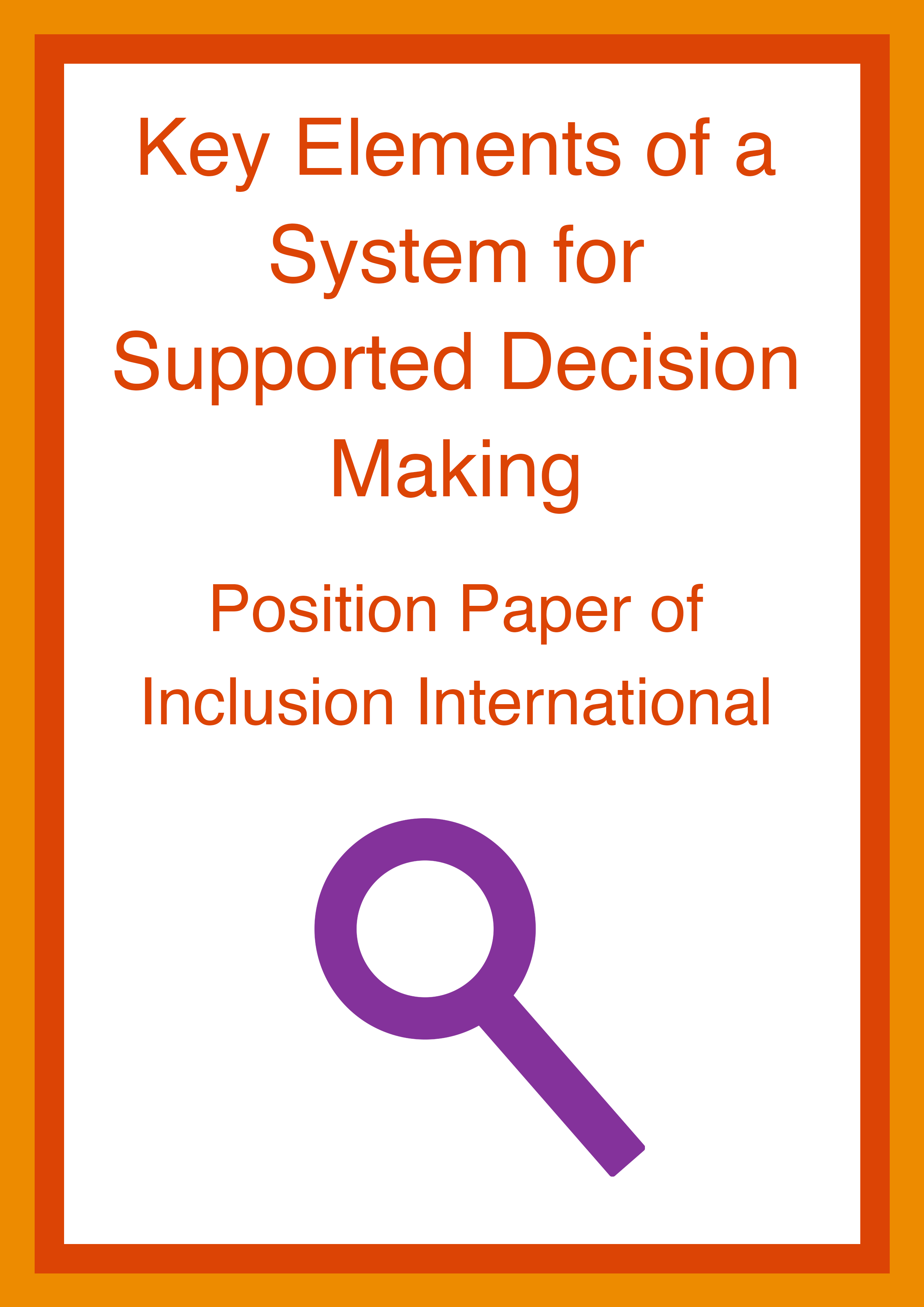
Key Elements of a System for Supported Decision Making: Inclusion International Position Paper
This Position Paper explores which key elements are necessary to implement the UN Convention on Rights of a Person with Disability in the legal systems of all countries that have ratified the Convention. Starting from the discussion of some basic notions regarding legal capacity, the Position Paper identifies eight elements that should be considered in the implementation of this article to make the UN Convention a tool that promotes the rights of persons with intellectual disabilities.
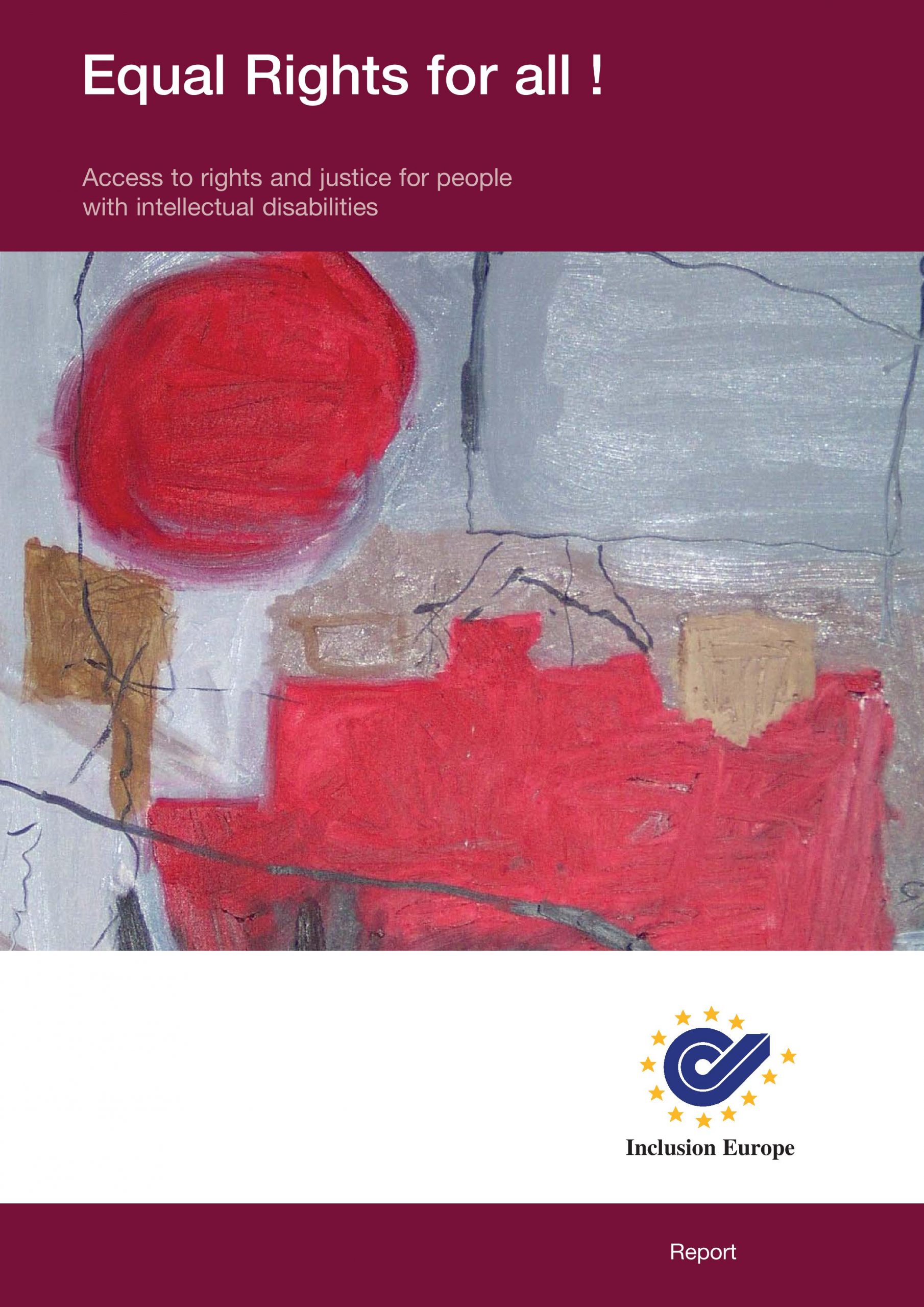
Equal Rights For All! Access To Rights And Justice For People With Intellectual Disabilities
In this document, the partners of the project “Justice, Rights and Inclusion for People with Intellectual Disabilities” have outlined some principles that cover the most important aspects of legal capacity, legal assistance, legal protection and representation of adults with intellectual disabilities.
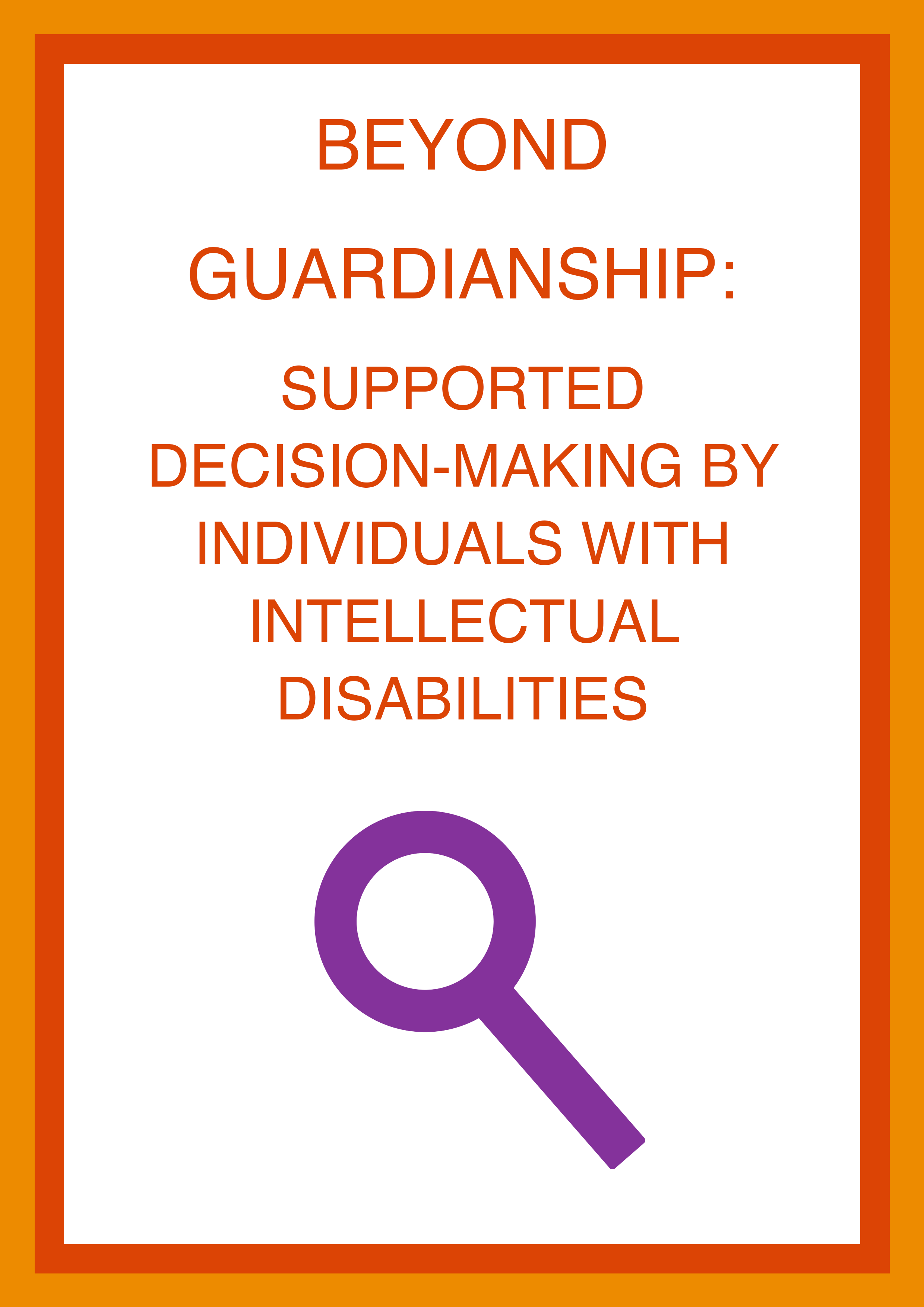
Beyond Guardianship: Supported Decision Making By Individuals With Intellectual Disabilities
This briefing paper prepares for a Roundtable discussion to explore and generate ideas beginning from a presumption of competence, promoting the rights, self-determination and independence of people with intellectual disabilities, emphasizing dignity and freedom of choice, supporting individuals with intellectual disabilities in the decision-making process and implementing the least restrictive options. For governments to fulfill their obligations under Article 12, this requires what many have referred to as a “paradigm shift” in the usual approaches to protecting and promoting the right to legal capacity. Adults can no longer be required to demonstrate that they meet certain tests of mental capacity in order to have their rights to legal capacity equally respected and protected. The United Nations Convention on the Rights of Persons with Disabilities (UNCRPD) recognizes this right and the supports needed to exercise it as an obligation, under international law, of governments to create and honour what is called “supported decision-making.”
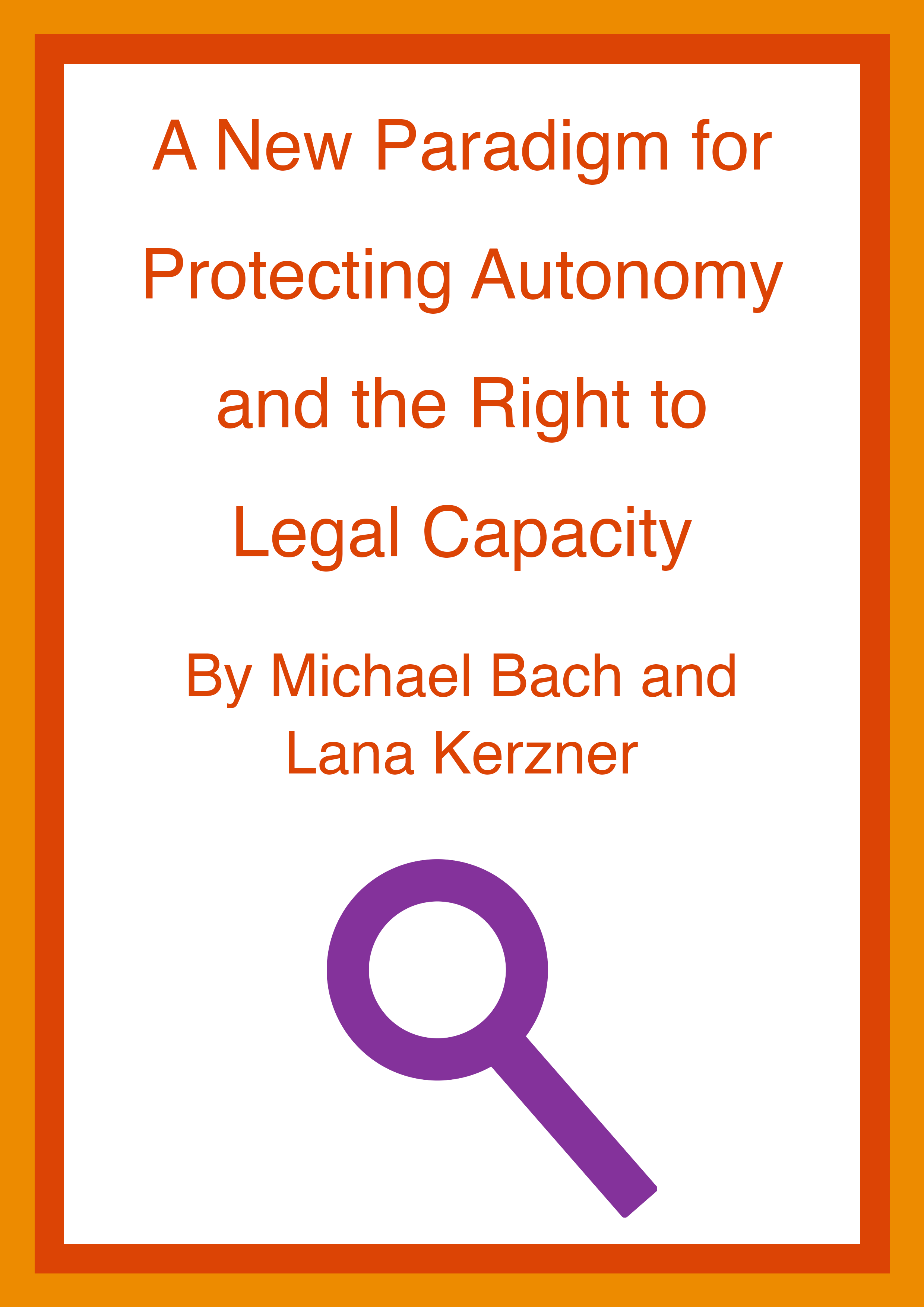
A New Paradigm for Protecting Autonomy and the Right to Legal Capacity
A summary of a paper that attempts to answer a question framed by the Law Commission of Ontario: “What principles and considerations should be applied when considering placing limitations on the ability of persons with disabilities to make their own choices?” In particular, the paper identifies persons with severe intellectual, cognitive or psychosocial disabilities as most at risk of being considered “not capable” of decision making by people caring for them.
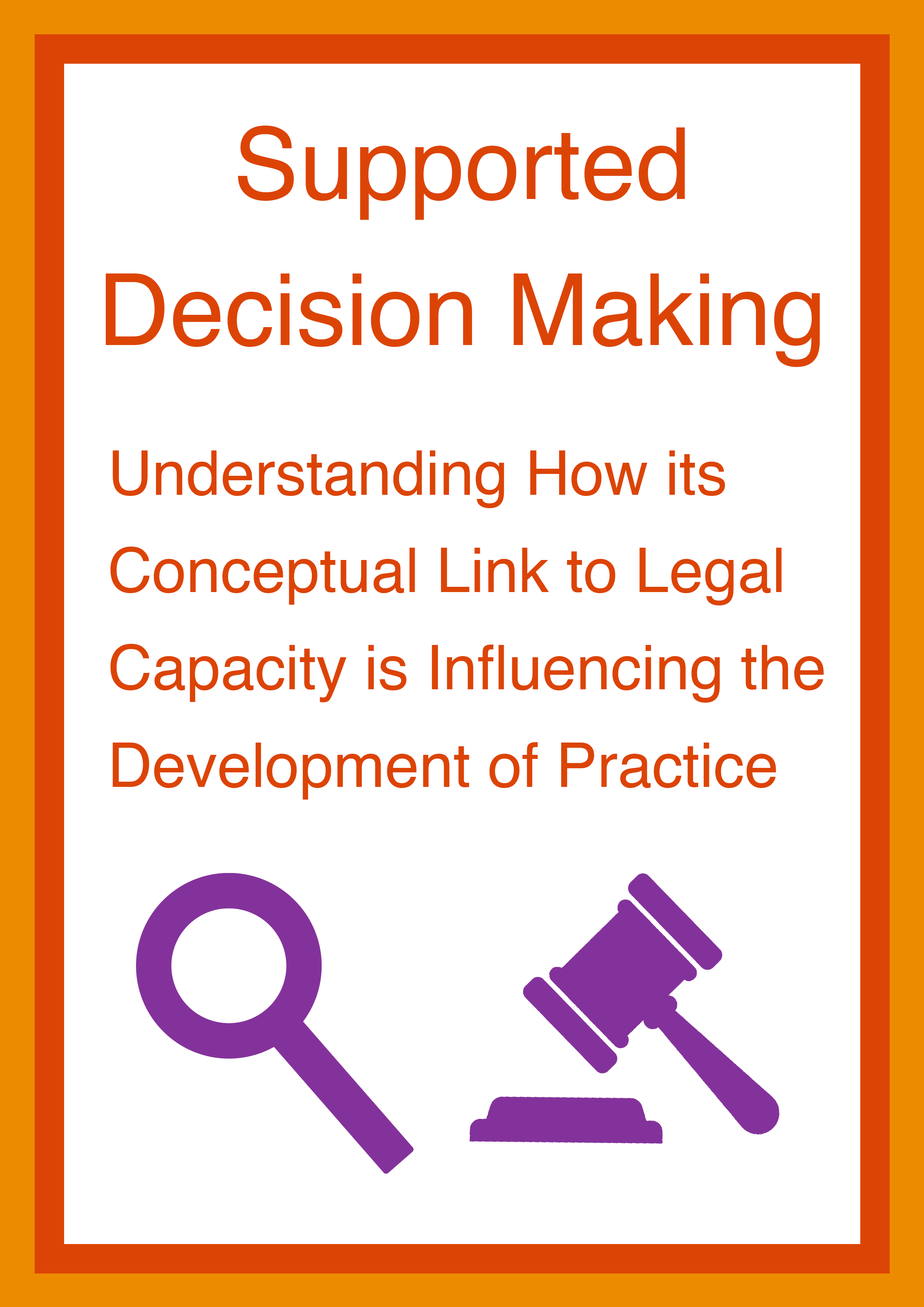
Supported Decision Making: Understanding How its Conceptual Link to Legal Capacity is Influencing the Development of Practice
This article aims to help readers to understand the conceptual link between supported decision making and legal capacity and how this is influencing the development of practice. It examines how the concept has been defined as: a process of supporting a person with decision making; a system that affords legal status; and a means of bringing a person’s will and preference to the centre of any substituted decision-making process. The conceptual link between supported decision making and legal capacity is explored by outlining three conceptualisations that are influencing the development of practice.
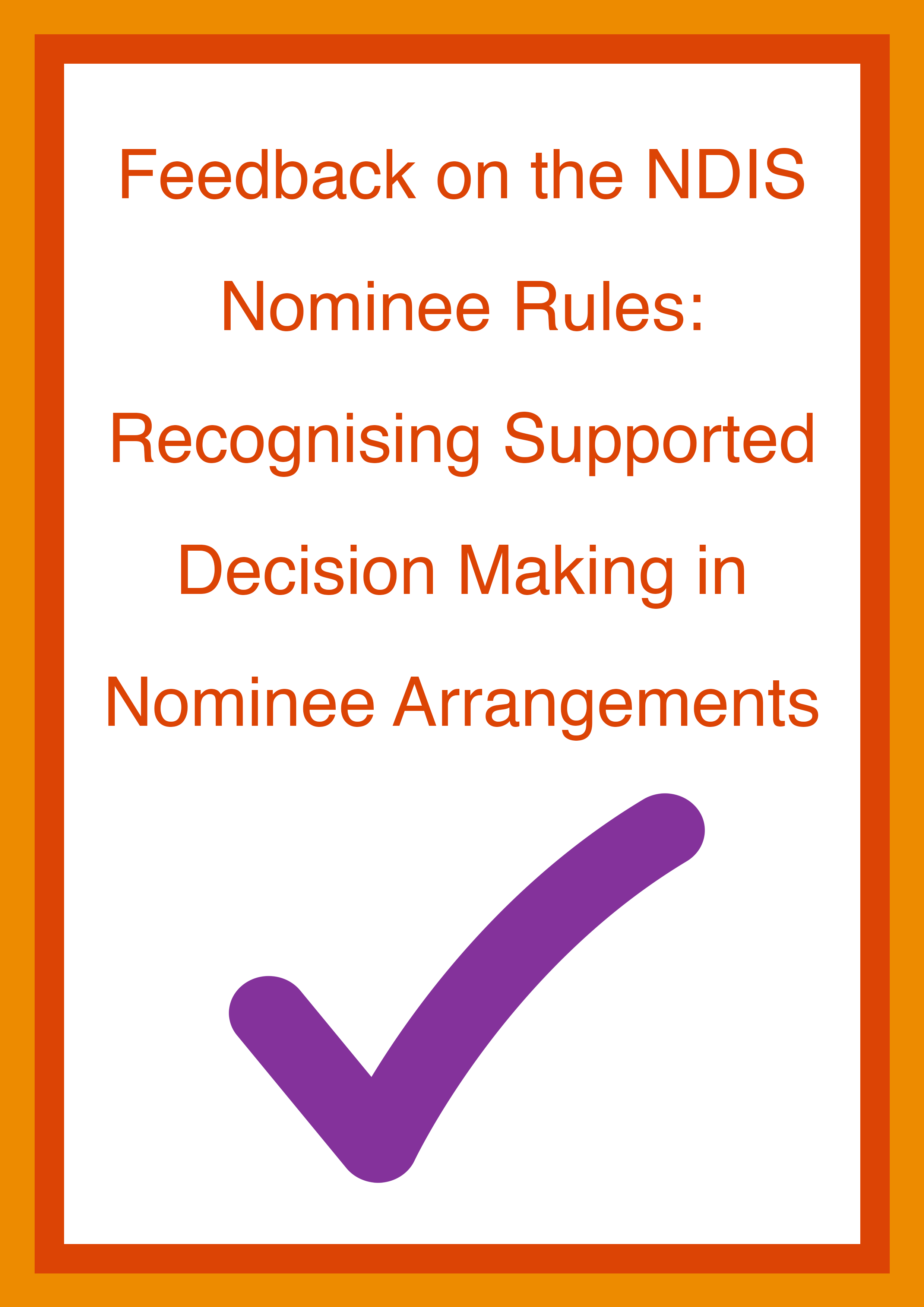
Feedback on the NDIS Nominee Rules: Recognising supported decision making in nominee arrangements
The principles of the NDIS Act, and the associated principles in the Nominee Rules (see the draft attached to this document), are sound principles that uphold the rights of participants. The draft legislation requires that participants are to be involved in decisions that affect them, including making decisions for themselves, to the extent possible. The draft rules require a presumption of decision making capacity, and that nominees will only be appointed when it is not possible for a person to be assisted to make decisions for themselves. This analysis suggests further division of the roles of nominees that occurs up front, as a way of maximising the opportunity for people with a disability to make decisions and gain personal authority in their lives through participation in the NDIS.
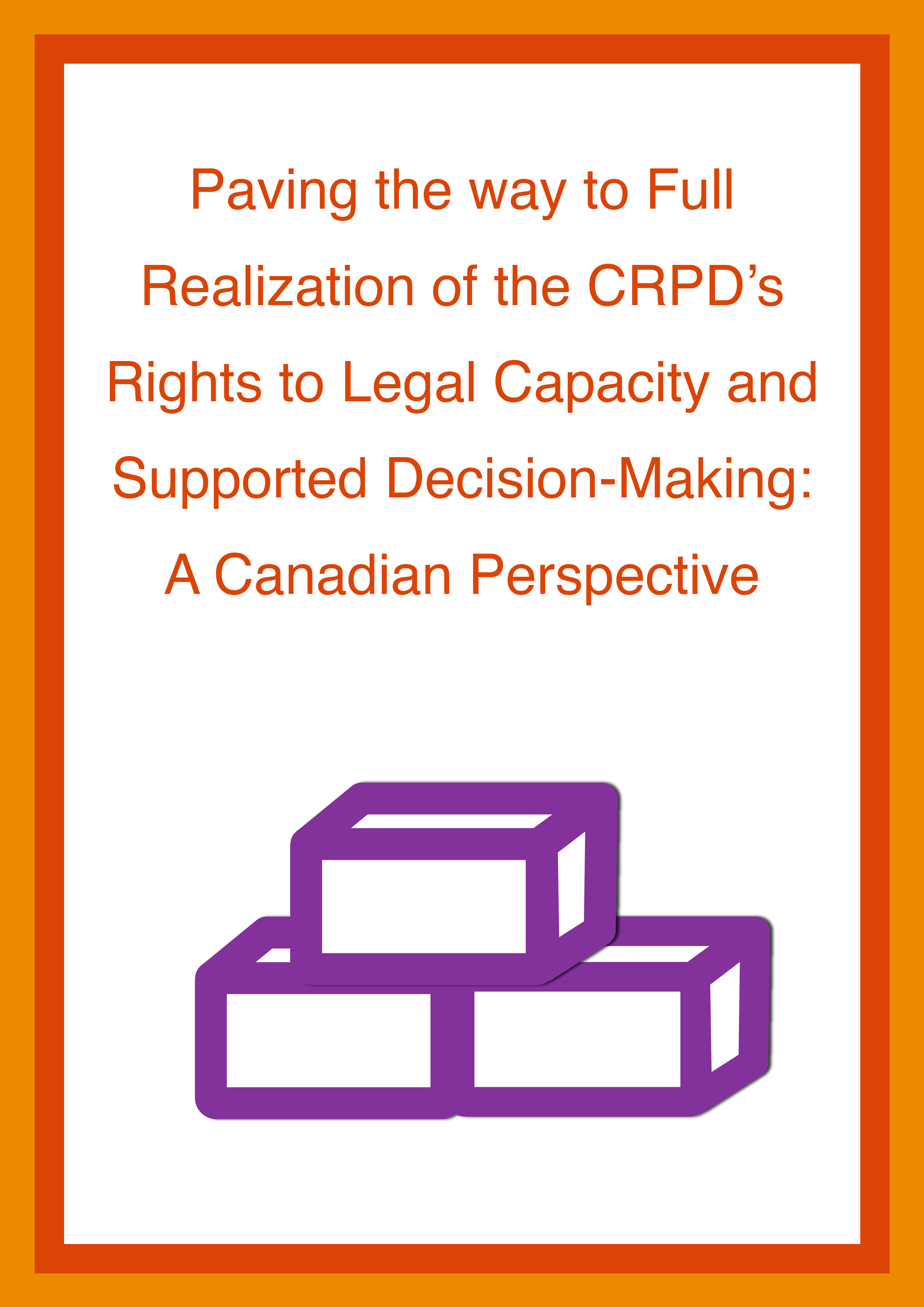
Paving the way to Full Realization of the CRPD’s Rights to Legal Capacity and Supported Decision-Making: A Canadian Perspective
This paper was written for a legal capacity symposium, “In From the Margins: New Foundations for Personhood and Legal Capacity in the 21st century,” being held at the University of British Columbia in April, 2011. It therefore focuses specifically on the article of the CRPD that addresses legal capacity, Article 12 is the section of the CRPD that specifically addresses the topics of legal capacity and decision-making. Before embarking on an analysis of Canada’s laws in the context of the extent to which they comply with Article 12, it is necessary to first explore its broad implications for decision-making regimes. What are the implications of the predominance of substitute decision-making regimes?
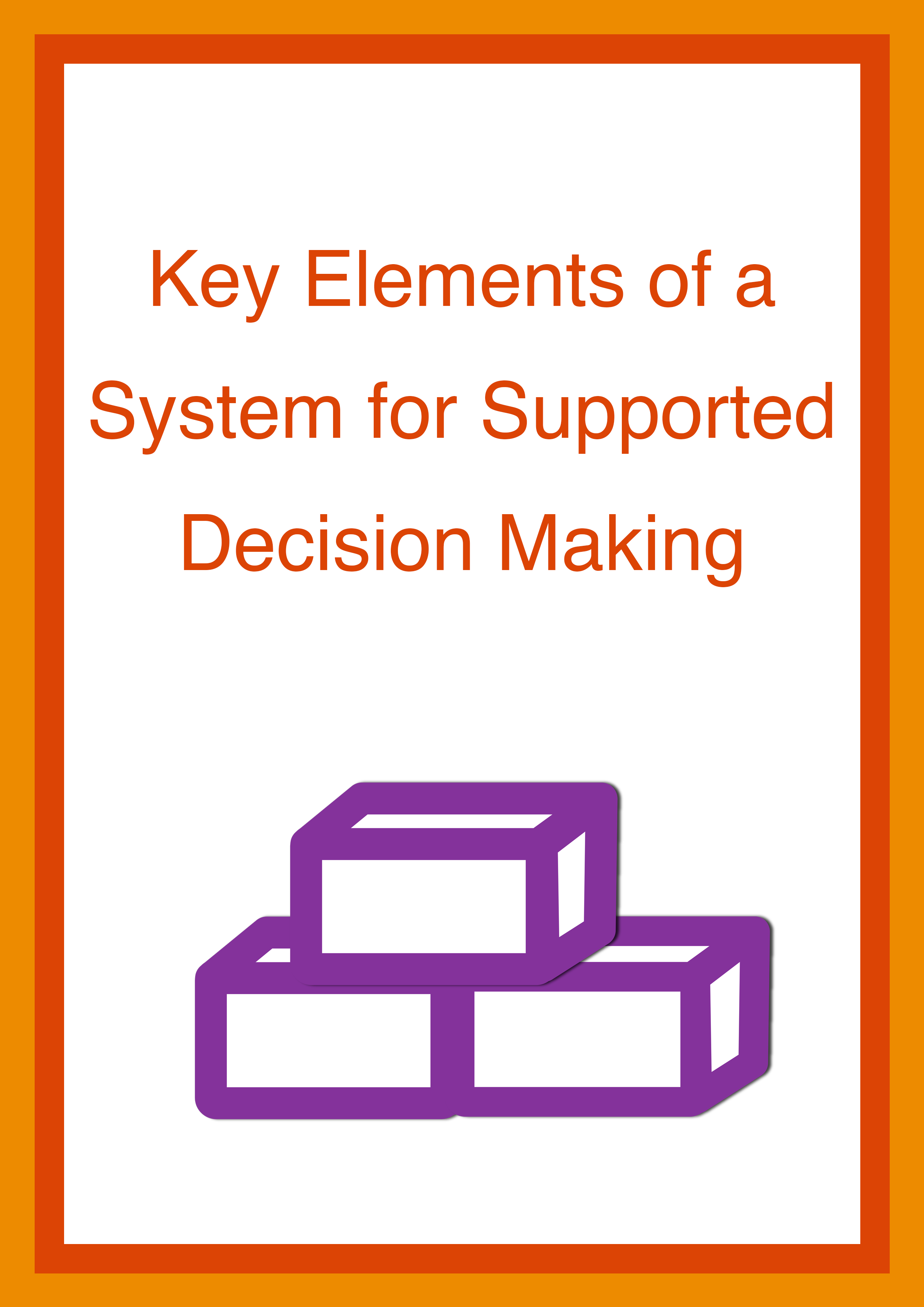
Key Elements of a System for Supported Decision-Making
The UN Convention on the Rights of Persons with Disabilities demands in its Article 12 equal recognition before the law for all persons with disabilities. This Position Paper explores which key elements are necessary to implement this principle in the legal systems of all European countries. Starting from the discussion of some basic notions regarding legal capacity, the Position Paper identifies eight elements that should be considered in the implementation of this article to make the UN Convention a tool that promotes the rights of persons with intellectual disabilities.
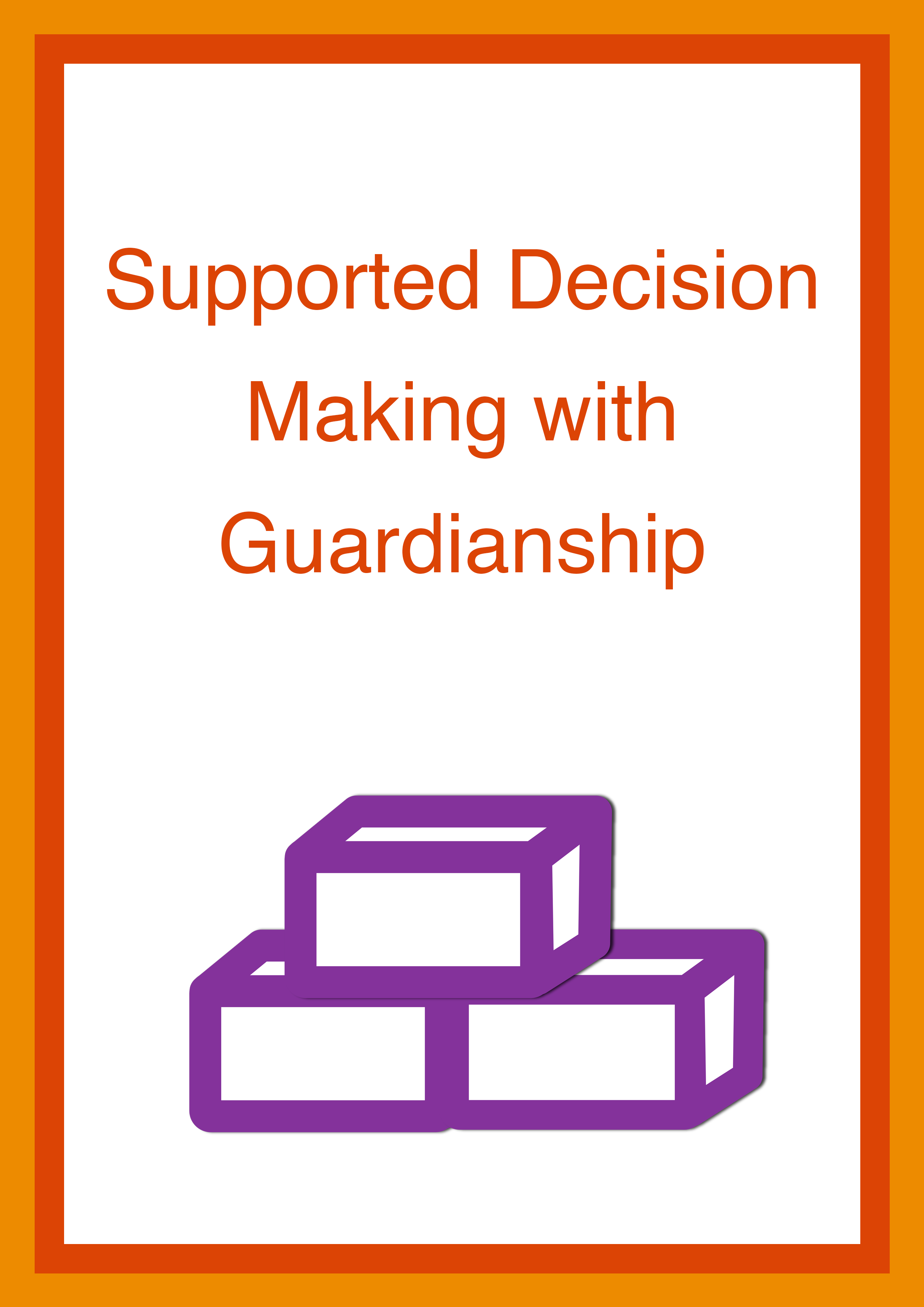
Supported Decision Making with Guardianship
Supported Decision Making (SDM) is getting the help you need, from the people you trust, to make your own decisions. Isn’t that how we all make decisions? We all need help when we’re faced with tough choices, or don’t understand our options, or just want some advice. It’s simple: they give you information and advice to help you make the best decision for you. They support you so you can decide what’s best for you.
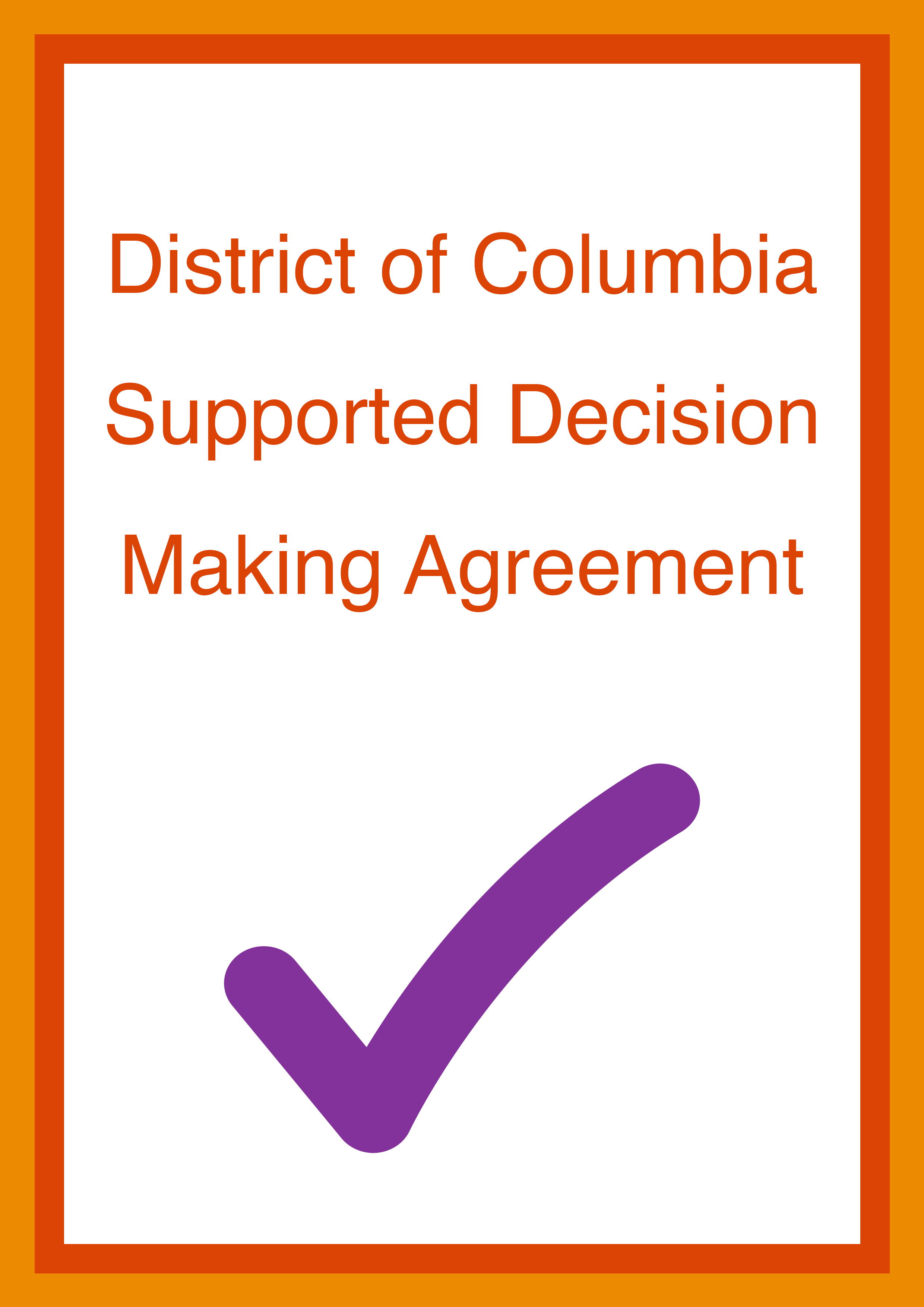
District of Columbia Supported Decision Making Agreement
Starting May 5, 2018, if you are a person with a disability, you can use the attached form to make Statutory Supported Decision‐Making Agreements (also called “SDMA”). The District of Columbia law that lets you do this is the “Disability Services Reform Amendment Act of 2018,” D.C. Law 22‐93.
The D.C. Department on Disability Services and Quality Trust for Individuals with Disabilities developed this Information and Instructions document to explain Supported Decision‐Making Agreements and help you understand how to use the SDMA form. Project ACTION! and the Family Support Council reviewed for accessibility.
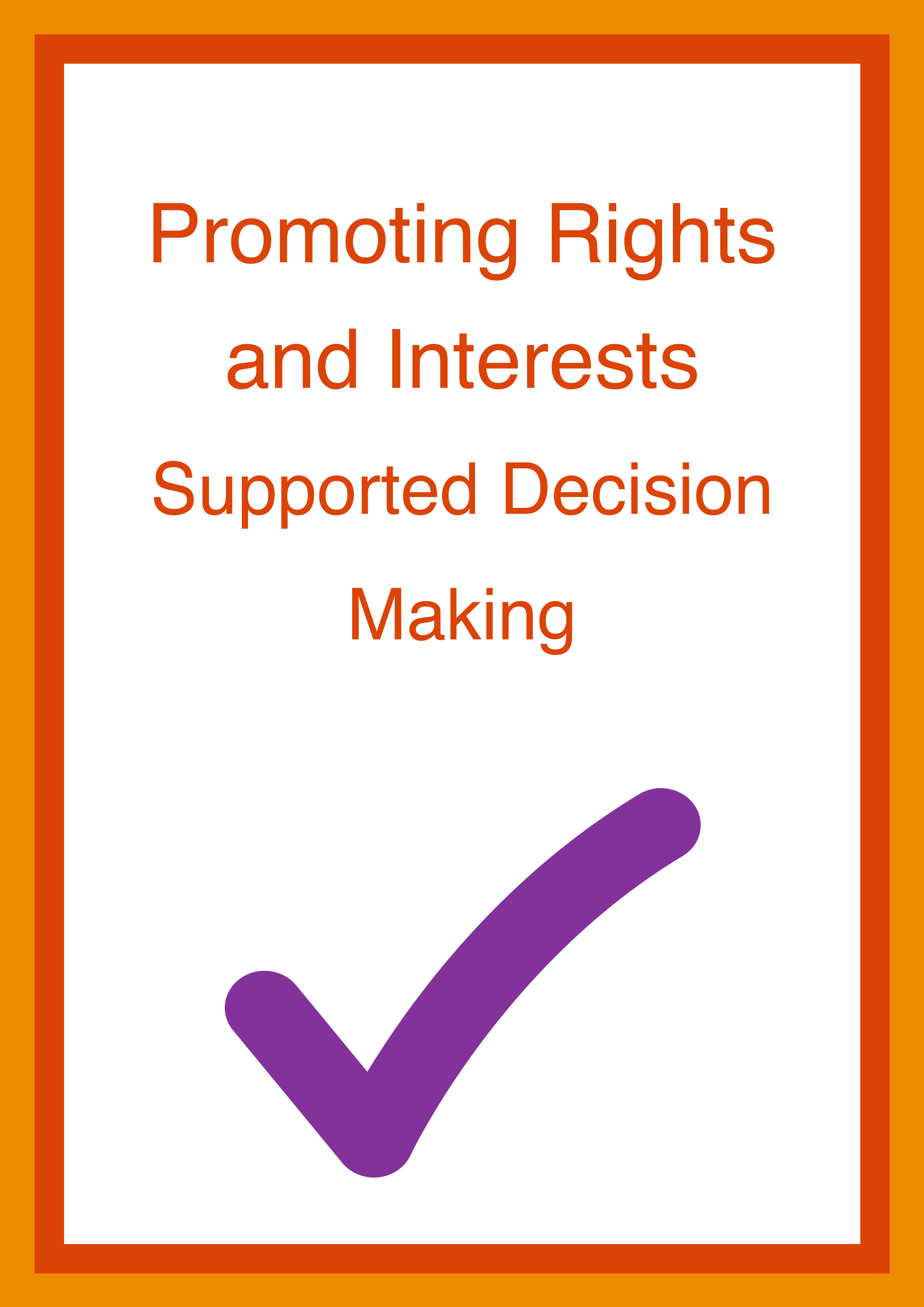
Promoting Rights and Interests: Supported Decision Making Annual Report
This report will reconsider the Stepped Model of Supported and Substitute Decision Making, the supported decision-making approach used in the South Australian Project, and the results of that project. This summary in this year’s Annual Report seeks to bring together this information.

The Right to Decide
In 2019, IRIS completed a study on how people with developmental, cognitive, and psychosocial disabilities lose the right to decide in their lives, and what can be done to address this growing problem.

The Equal Right to Decide in Canada: Closing the Gap – Policy Brief
Some of IRIS’s recommendations for reform include the following: Legally recognize “independent” and “interdependent” decision-making capability. Legal definitions of what is required to exercise legal capacity need to change, consistent with the Convention on the Rights of Persons with Disabilities (CRPD) and the Charter of Rights and Freedoms. It is not having certain cognitive abilities that should give people power over their lives. People with even the most significant intellectual disabilities can direct their lives when they have support from others to turn their intentions, what matters most to them, into legal decisions. The CRPD requires governments to ensure the supports to do so are available.

Supported Decision Making: A roadmap for reform in Newfoundland and Labrador
IRIS – Institute for Research and Development on Inclusion and Society was engaged by the Newfoundland and Labrador Association for Community Living, on behalf of the ‘Steering Committee on Citizenship and Legal Capacity for All’ to: identify key issues and barriers to legal capacity; recommend directions for reform; and outline a ‘roadmap’ to implement them. The review involved focus groups and key informant interviews with community stakeholders and senior government officials, as well as extensive legal research.

Convention on the Rights of Persons with Disabilities
The Committee on the Rights of Persons with Disabilities (CRPD) is the body of independent experts which monitors implementation of the Convention by the States Parties. The purpose of the present Convention is to promote, protect and ensure the full and equal enjoyment of all human rights and fundamental freedoms by all persons with disabilities, and to promote respect for their inherent dignity.

Guardianship Reform: Supported Decision Making and Maine’s New Probate Code
Published in the Fall/Winter Edition of the Maine Bar Journal, managing attorney Staci Converse discusses Maine’s new Probate Code and the ability for Supported Decision-Making to empower and support people with disabilities to make their own decisions.

Communication as a Human Right: Citizenship, politics and the role of the speech language pathologist.
The purpose of this paper is to elucidate communication as a human right for Declan. This commentary paper is co-written by Declan, his sister who is a speech-language pathologist (SLP) with an advocacy role, his SLP, and academics. Declan discusses, in his own words, what makes communication hard, what helps communication, his experiences of speech-language pathology, and what he knows about human rights. He also discusses his passion for politics, his right to be an active citizen and participate in the political process.

Realising ‘will, preferences and rights’: reconciling differences on best practice support for decision-making?
This article explores key debates across disciplines and draws on grounded theory fieldwork findings to bring greater clarity to the principle within law, policy and practice settings. It is argued that the principle calls for a nuanced understanding which cautions against expectations that mere enactment into law or adoption within programs of support will prove to be a panacea.

Supported Decision Making and Paradigm Shifts: Word Play or Real Change?
As is the case for many jurisdictions Scotland is wrestling with the issue of giving meaningful effect to the Convention on the Rights of Persons with Disabilities (CRPD), particularly its Article 12,and the extent to which this is possible. Indeed, whilst some of the conceptual and practical aspects of giving effect to Article 12 are unique to Scotland many other conceptual, and some practical, aspects are common to most states. A consideration of these issues are therefore of value to those seeking to bring about CRPD related change in Scotland and also in other jurisdictions.

Beyond Guardianship
The National Council on Disability (NCD) undertook this report to foster a greater understanding of guardianship within the context of disability law and policy; to examine the treatment of people with disabilities within the legal system that establishes guardianship; to examine the use of alternatives to guardianship such as supported decision-making; and to make recommendations that will help align the use of guardianship and decision-making alternatives with the Americans with Disabilities Act (ADA) with particular focus on the integration mandate. The report’s findings and recommendations are the product of qualitative research on the experiences with guardianship and decision making alternatives of people with disabilities, their families, and professionals within the guardianship system gleaned through interviews; in addition to an extensive review of relevant scholarship and recent studies.

Supported Decision Making and the Human Right of Legal Capacity
The United Nations Convention on the Rights of Persons With Disabilities (CRPD) establishes a new paradigm of supported decision-making, rather than guardianship or substituted decision-making, for people with intellectual disability (ID). Article 12 of the CRPD guarantees every person’s right to legal capacity—to make her/his own decisions and have those decisions legally recognized—and specifically requires governments to provide people with ID the supports they may need to exercise legal capacity. The Article describes the human rights regime and explores different forms of supported decision-making and legislative efforts to abolish guardianship. It calls for a paradigm shift in how we view people with ID, from inquiry into what a person cannot do, to supports necessary to enable her/him to make her/his own decisions, and the legal efforts necessary to ensure that such decisions are recognized by third parties including financial institutions, healthcare providers, and government agencies.

The Right to Legal Capacity Under the UN Convention on the Rights of Persons with Disabilities: Key Concepts
This paper is written with people with intellectual disabilities in mind, but the questions, analysis and approach may be more widely applicable to other groups as well. The aim is to examine theories of ‘personhood’ for the criteria they provide for founding and recognizing the right to legal capacity. The paper examines how current criteria of personhood and legal capacity systematically discriminate against people with intellectual disabilities in recognition and enjoyment of their legal capacity. It draws on more recent conceptions of personhood from moral and political philosophy to suggest directions for law reform that could be taken to address this barrier in law, policy and practice.

The Right to Make Choices
This guide helps people understand decision-making laws. You will learn about different kinds of support you can use to make choices. You will also learn about how people in different countries have changed their laws to help people with disabilities make our own choices. Freedom to make our own choices is a human right.

The Right to Make Choices – Easy Read
This Easy Read guide helps people understand decision-making laws. You will learn about different kinds of support you can use to make choices. You will also learn about how people in different countries have changed their laws to help people with disabilities make our own choices. Freedom to make our own choices is a human right.

Looking Differently at Disability and Decision Making
Legal capacity is the right to make decisions that affect your own life. It’s a right that people with intellectual and cognitive disabilities are routinely denied. Michael Bach of the Institute for Research and Development on Inclusion and Society talks about how “supported decision making” can allow those with disabilities to take back control with the help of their families and communities.

Reflections on Making Supported Decision Making a Reality
Audrey Cole, mother of Ian and Distinguished Associate with the Canadian Association for Community Living, reflects on her decades long journey to help make supported decision making a reality for people with disabilities.

Report on Legislation by the Mental Health and Disability Law Committee
The New York City Bar published a report by the Mental Health Law Committee and the Disability Law Committee on June 30th 2021.

Increasingly Consulted, but not yet Participating
This report presents the findings of the first-ever global survey led by Organisations of Persons with Disabilities (OPDs) on their participation in decision-making. It is the first attempt of this scale to monitor how Article 4.3 and Article 32 of the Convention on the Rights of Persons with Disabilities (CRPD) is turned into action. The exclusion of persons with disabilities from decision-making processes perpetuates and exacerbates their exclusion from all areas of society. When their perspectives are systematically ignored, this leads to public policies and programmes that are not responsive, not effective and continue to hinder their rights.

American Bar Association Resolution 113
In 2017, the American Bar Association’s (ABA) House of Delegates adopted Resolution 113, urging state, territorial, and tribal legislatures to (1) amend their guardianship statutes to require that supported decision-making be identified and fully considered as a less restrictive alternative, before guardianship is imposed, and (2) require that decision-making supports that would meet the individual’s needs be identified and fully considered in proceedings for termination of guardianship and restoration of rights.

Support for Decision Making in the NDIS
The purpose of this paper is to develop an understanding of the concept of support for decision making in the NDIS. The paper will provide the basis of advice to the NDIA Board in relation to the development and implementation of a consistent approach for support for decision making that meets the Scheme obligations and aspirations to provide real choice for people with disability. Supported decision making starts from the premise that everyone has the right to participate in decision making and everyone draws on some support at some time to make some decisions.

Disability Rights in Real Life
Disability Rights in Real Life aims to provide the disability community with information on their rights and to know when they might need a disability rights lawyer. It is no substitute for legal advice, but it is a great place to start to have good conversations with your lawyer about disability rights.

At the Interface Between Paradigms: English Mental Capacity Law and the CRPD
The United Nations Convention on the Rights of Persons with Disabilities (CRPD) is rightly seen as a break from the past in mental capacity law. At the same time, implementation will occur in the specific existing legal and administrative contexts of each State. This article uses English mental capacity law to explore these issues. The English Mental Capacity Act 2005 (MCA) can be considered the best of the “old” paradigm. The article argues that there are continuities between it and a CRPD-compliant approach.

A Watershed for the Rights of People with Disabilities
In late 2019, the Open Society Foundations’ New York office held an event to consider the reforms in Peru and Colombia, and to discuss broader questions of how best to safeguard and expand the rights of people with disabilities. This webpage contains the audio recording of this discussion.

Supporting Choice and Control: An analysis of the approach taken to legal capacity in Australia’s National Disability Insurance Scheme
This article will examine how the notion of choice and control has been operationalized within the NDIS framework and critically analyse this against the requirements of the United Nations Convention on the Rights of Persons with Disabilities (CRPD) adopted in 2006. It will demonstrate that whilst the NDIS seeks to promote individual autonomy and champion the provision of support, it still permits a substituted decision-making model for the exercise of legal capacity via the appointment of nominees.

Editorial: Human Rights and Mental Health: Current Developments in Competence Assessment and Supported Decision Making
This Research Topic presents the results of the international and interdisciplinary workshop Human Rights and Mental Health, held at the Institute for Medical Ethics and History of Medicine of the Ruhr University Bochum, Germany, on April 1–5, 2019. The workshop focused on ethical and legal issues surrounding the implementation of the United Nations (UN) Convention on the Rights of Persons with Disabilities (CRPD) in mental health care.

Piloting Personhood: Reflections from the first year of a supported decision making project
The Symposium on Personhood and Civic Engagement by People with Disabilities included a variety of perspectives: legal, cultural, historical, philosophical, and educational, including a panel on “Legal Barriers to Personhood” from which this article was derived. This Article attempts to describe some of the lessons learned in the first year of an ongoing experiment in implementing legal capacity through supported decision-making (SDM). Demonstrating the success of this pilot project, the first in New York and the most extensive in the United States, is critical to influencing advocacy and legislative reform to promote and protect personhood.

The use of neuroscience and psychological measurement in England’s Court of Protection
The Court of Protection (CoP) of England and Wales was established in its current form as a specialised court dealing with matters arising from the Mental Capacity Act 2005 (MCA 2005). Structured testing of brain and psychological function is used in limited ways in the Court of Protection. Whilst there are challenges in creating measures of capacity, this article highlights an opportunity for the neuroscience community to improve objectivity in assessment, inside and outside the courtroom.

Let’s Talk About Supported Decision Making
This Toolkit provides guidance, tips and templates provided by the Wisconsin Department of Health Services . Wisconsin state law formally recognizes Supported Decision Making agreements as legal arrangements that allow persons to retain their right to make their own decisions, while also choosing trusted people (called Supporters) to help them gather and understand information, compare options, and communicate their decisions to others.

Union of Equality: Strategy for the Rights of Persons with Disability 2021-2030
With this Strategy, the Commission aims to deliver further significant improvements to all areas of the lives of persons with disabilities within the EU and beyond. Over the coming decade, this Strategy will support both Member States and EU institutions in their endeavour to implement the UNCRPD. Accomplishing the initiatives envisaged in this strategy will contribute to reducing discrimination, inequalities and supporting persons with disabilities to fully enjoy their human rights, fundamental freedoms and EU rights on an equal basis with others, by 2030, to maximize their independence, participation and decent living conditions.

What is Article 12 and Legal Capacity?
The UN Convention on the Rights of Persons with Disabilities (UN CRPD) is a binding United Nations human rights treaty for persons with disabilities – Signed and ratified by almost all EU Member States and the EU itself. Article 12. of the UNCRPD wants to ensure that every person with disabilities including people with psychosocial disabilities may enjoy equal recognition before the law which requires legal capacity. This short animated video seeks to explain what legal capacity is all about and recalls that everyone has the inherent right to make their own choices including people with psychosocial disabilities.

Guidance on Community Mental Health Services
This publication promotes good practice and person-centred, rights based approaches. Many people with mental health conditions and psychosocial disabilities are denied the right to exercise their legal capacity; that is, the right to make decisions for oneself and to have those decisions respected by others.

Inclusion Australia: Submission to the NDIS Support for Decision Making Consultation
The National Disability Insurance Agency (NDIA) released their ‘Supporting you to make your own decisions’ consultation paper in June 2021. Inclusion Australia’s response includes feedback on the Paper, recommendations for the NDIS Support for Decision Making policy and case studies to help the NDIA better understand the lived experiences of decision makers and their supporters.

Convention on the Rights of Persons with Disabilities Research Report – Easy Read
This Easy Read report is a summary of a report called Convention on the Rights of Persons with Disabilities: Shining a light on Social Transformation.

Supported Decision Making: Promoting Individual Rights as an Alternative to Guardianship
South Carolina would benefit from formally recognizing alternatives, like supported decision-making, so those who need support can access it without giving up their rights to control their own life

Making Decisions – Letter Templates
If your relative is over the age of 16 and does not have capacity to make a particular decision, the law (Mental Capacity Act 2005) says that, a decision must be made in the person’s ‘best interests’. Your relative should be supported to input to the decision as much as possible. This template letter resource was produced by the Challenging Behaviour Foundation in partnership with Mencap, Ambitious about Autism and Irwin Mitchell Solicitors. The letters ask the decision maker to consult you and your relative in the decision making process and clearly set out the legal requirements to involve you both.

Decision Making, Confidentiality and Sharing Information
This guide provides a summary for parents to provide an overview of the law and policy relevant to decision-making in health and social care, including the duty of confidentiality and sharing information. This is an important area because parents are likely to find that their role in decision-making about their child’s care and support changes as their child gets older.

Supported Decision-Making: EVERYONE has the Right to Make Choices
This video explains Supported Decision Making as a basic human right and alternative to guardianship.

Nevada’s Supported Decision Making Act
On a spring morning in 2019 at the Capitol Building in Carson City, more than a dozen self-advocates accompanied by their proud families joined with Governor Steve Sisolak and legislative leaders, as well as state judicial and executive branch representatives for the signing of Assembly Bill 480, Nevada’s Supported Decision-Making Act.

Supported Decision Making: Protecting Rights, Ensuring Choices
Jonathan Martinis walks us through the importance of Supported Decision Making and the fundamental human right of being able to make your own choices in life.

Practical Tool and Resource Guide for Lawyers: Steps in Supporting Decision Making
The comprehensive resource guide for lawyers includes a four page fillable PDF tool, which aims to help lawyers identify and implement decision-making options for persons with disabilities that are less restrictive than guardianship. This resource is a joint product of four American Bar Association entities – the Commission on Law and Aging, Commission on Disability Rights, Section on Civil Rights and Social Justice, and Section on Real Property, Trust and Estate Law, with assistance from the National Resource Centre for Supported Decision-Making.

Bizchut: Article 12- Supported Decision Making Pilot
Bizchut strives to remove the physical and social barriers that stand in the way of people with disabilities in Israel, aspiring to ensure equal rights, full inclusion and participation in society in education, employment, housing, health and leisure services and access and to raise public awareness of the rights and needs of people with disabilities.

Position Statement: Autonomy, Decision Making Supports and Guardianship
Position statement of The Arc and the American Association on Intellectual and Developmental Disabilities on autonomy, decision-making supports, and guardianship.
What is Supported Decision Making?
Dr Browning explains the practicalities of Supported Decision Making.
Funded by the Australian Government Department of Social Services. Go to www.dss.gov.au for more information.

Australia’s Interpretative Declaration on the Convention on the Rights of Persons with Disabilities (CRPD)
To assist the Royal Commission, the Australian Government has prepared this background paper addressing Australia’s international human rights obligations. In particular, this paper focuses on the Australian Government’s interpretation of Australia’s obligations under the CRPD and the Australian Government’s position with respect to a number of cross-cutting concepts under the CRPD. Throughout the course of the Royal Commission’s inquiries, the Australian Government may wish to provide more detailed views on aspects of Australia’s obligations under the CRPD following on from this background paper.

Are We Moving Forward?
Regional study on the rights of women with disabilities in the Middle East. Women with disabilities continue to face discrimination on a daily basis all over the world. In the Middle East and North Africa region poor rule of law and governance, traditional and cultural practices and prejudice, poverty are all factors impeding the successful fulfilment of the human rights of the most vulnerable section of society. It is hoped that this study will be useful for the advancement of the rights of women with disabilities and serve as a tool for regional and national governmental institutions and members of parliaments of Jordan, Egypt, Palestine, Yemen and Sudan.

Ensuring Disability Rights in Civil Judicial Cooperation
European Disability Forum position paper March 2022. This document was prepared to contribute to the consultation of the European Commission on Civil judicial cooperation – EU-wide protection for vulnerable adults. It provides recommendations to the European Union (EU) on the issue of cross-border legal protection of vulnerable adults and the use of the 2000 Hague Convention on the International Protection of Adults.

EU Human Rights Report: Sustainable Development Goals
European Human Rights Report issue 2-2018. The 2030 Agenda and the Sustainable Development Goals: A European perspective to respect, protect and fulfil the United Convention on the Rights of Persons with Disabilities. European Disability Forum is an umbrella organisation of persons with disabilities that defends the interests of over 100 million persons with disabilities in Europe.

The Empowerment of Women and Girls with Disabilities
UN Women’s Strategy: The Empowerment of Women and Girls with Disabilities – Towards Full and Effective Participation and Gender Equality was developed to ensure a more systematic approach to strengthen the inclusion of the rights of women and girls with disabilities in UN Women’s efforts to achieve gender equality, empowerment of all women and girls, and the realization of their rights. The Strategy aligns with UN Women’s Strategic Plan 2018–2021 and commitments made in the common chapter to the Strategic Plans of UNDP, UNFPA, UNICEF and UN Women, and further builds upon UN Women’s work in the area of empowerment of women and girls with disabilities.

Disability in a Human Rights Context
The Convention on the Rights of Persons with Disabilities (CRPD) is a modern human rights treaty with innovative components. It impacts on disability studies as well as human rights law. Two innovations are scrutinized in this article: the model of disability and the equality and discrimination concepts of the CRPD.

Legal Capacity
This report presents the European Union Agency for Fundamental Rights’ (FRA) legal analysis of standards and safeguards concerning the legal capacity of persons with intellectual disabilities and persons with mental health problems. Thus far, the CRPD Committee’s concluding observations forcefully underline the convention’s guarantees, which would support calls to abolish or overhaul national legislation that allows for substituted decision-making models and replace them with supported decision-making measures that respect the person’s autonomy, will and preferences.

The Situation of Indigenous Children with Disabilities
This study focuses on a rights-based approach, giving attention to human rights enjoyed by indigenous children with disabilities. The main human rights that are at risk are the right to life, the right to physical integrity (freedom from violence, torture and cruelty) and freedom of movement. Another crucial right for these children, while often forgotten, is the right to participation and non-discrimination in society in accordance to their age. That means the right to play, the right to education, the right to be heard and the right to a life free from child labour and domestic exploitation.

Seeing The Ability, Not The Disability
This guide reflects research and international experiences in ratifying the United Nations Convention on the Rights of Persons with Disabilities (CRPD) and its implementation. The convention, as one of international human rights laws, pursues the goal of safeguarding the integrity and dignity of person’s with disabilities by establishing legal obligations on states to protect their rights.

Moving from Support for Decision-making to Substitute Decision-making: Legal Frameworks and Perspectives of Supporters of Adults with Intellectual Disabilities
This paper describes the legal substitute and supported decision-making frameworks (excluding mental health legislation) that operate in Australian jurisdictions and goes on to offer some insights into the lived experience of those providing informal support to adults with an intellectual disability.

Decision Making and Consent – Other resources
The Decision Making and Consent Other Resources contains additional information and links relating to supporting a person with disability to make decisions
that affect them.

Research Report: A framework for supported decision-making: Easy Read version
This Easy Read report is a summary of a report called Diversity, dignity, equity and best practice: a framework for supported decision-making.
A summary only includes the most important ideas.

Book review: Global Perspectives on legal capacity reform: Our Voices, Our Stories
This edited collection is the culmination of the ‘VOICES’ (Voices of Individuals Collectively Exploring Self-Determination) project, a three-year undertaking led by Professor Eilionoir Flynn of the Centre for Disability Law and Policy (NUI, Galway, Ireland) that explored and sought to change the law regarding legal capacity, and the right to equal recognition before the law, for people with disabilities (broadly defined as the right to make decisions with legal consequences, and to have these decisions respected in law; as enshrined in Article 12 of the United Nations Convention on the Rights of Persons with Disabilities [UNCRPD])

Research Report: Diversity, dignity, equity and best practice: a framework for supported decision-making
This research aimed to understand the significance of supported decision-making to the lives of people with cognitive disabilities, identify its essential elements common to anyone with cognitive disabilities in any context, and locate key implementation issues. For this Report, we understand people with cognitive disabilities to include people with intellectual disabilities, acquired brain injury, dementia and mental health conditions. Synthesising the research findings, this Report articulates the benefits of supported decision-making, sets out nine principles and eight essential elements of a ‘Diversity, Dignity, Equity and Best Practice Framework for Supported Decision-making’ and recommends implementation strategies.

Supported Decision Making in Victoria
This guide takes readers through the various ways in which supported decision-making can occur in Victoria, taking account of all the legal possibilities, while also providing best-practice advice. Supported decision-making is different to other decision-making practices such as traditional guardianship, where a person with a disability is represented by another in their decision-making.

Roundtable Supported decision-making and guardianship: Proposals for reform
The Royal Commission into the Violence, Abuse, Neglect and Exploitation of People with Disability (the Royal Commission) is looking at the right to autonomy for people with disability, including how this applies in guardianship and decision-making arrangements.

Supported Decision Making: A Copernican Revolution
While supported decision-making is about helping others to make decisions, its vision in many respects is revolutionary, and asks us to think about some fundamental things differently. By recognising decision making as an interdependent process and embracing a new way of thinking about decision-making capacity we are able to forge new ways for people with disability to take back control of their lives. Many people with disability have been subject to informal and formal substituted decision-making arrangements directed by what other people believe to be in their best interest. Article 12 of the United Nations Convention for the Rights of Persons with Disabilities (UNCRPD) says this is no longer acceptable. All people have a right to receive the support they need to direct the decisions which shape their lives and be legal decision makers.

My Life Story
Justin Clark tells the story of how he fought for the right to make his own decisions and leave the institution where he lived for 18 years, to live his life as he chose. In 1982, he won the right to leave the institution and make his own decisions about his future. The impact of his case — a pivotal moment in the Canadian disability rights movement — continues to be felt today.

Supported Decision-Making – Experiences of a Decision Supporter
This is part five of a five part series on supported decision-making. Hear from Carolyn about her experiences being a decision supporter and advocate.

Supported Decision-Making – The experiences of a decision maker
This is part four of a five part series on supported decision-making. Hear from Ruby about ways she has been supported to make her own decisions.

Supported Decision-Making – Supporting good decision making processes
This is part three of a five part series on supported decision-making. Good support for decision-making starts with helping the decision maker identify there is a decision to be made. People need to understand what the decision is about, and be made aware of constraints affecting the process such as limited time.

Supported Decision-Making – Supporting guardianship to become the last resort
This is part two of a five part series on supported decision-making. Currently, the Public Advocate is appointed by the South Australian Civil and Administrative Tribunal when a person who needs to make an important decision for themselves is found to have a mental incapacity. However, good decision support can change a person’s capacity in relation to their decision-making.

Decision Support as a Fundamental Human Right
This is part one of a five part series on supported decision-making. Over the course of our lives, we will all need support to make important decisions. When we experience disability through illness, injury, stress, trauma and the influence of major medications we may need significant support to be able to make decisions.
Supported Decision Making is a Right
Dr Browning talks about the importance of Supported Decision Making and the United Nations Convention on the Rights of Persons with Disabilities (UNCRPD).
Aims of Supported Decision Making
Dr Browning speaks about the two important aims of Supported Decision Making.
Dr Browning refers to a video on legal capacity by Michael Bach which you can watch via this link: Looking Differently at Disability and Decision Making – YouTube
